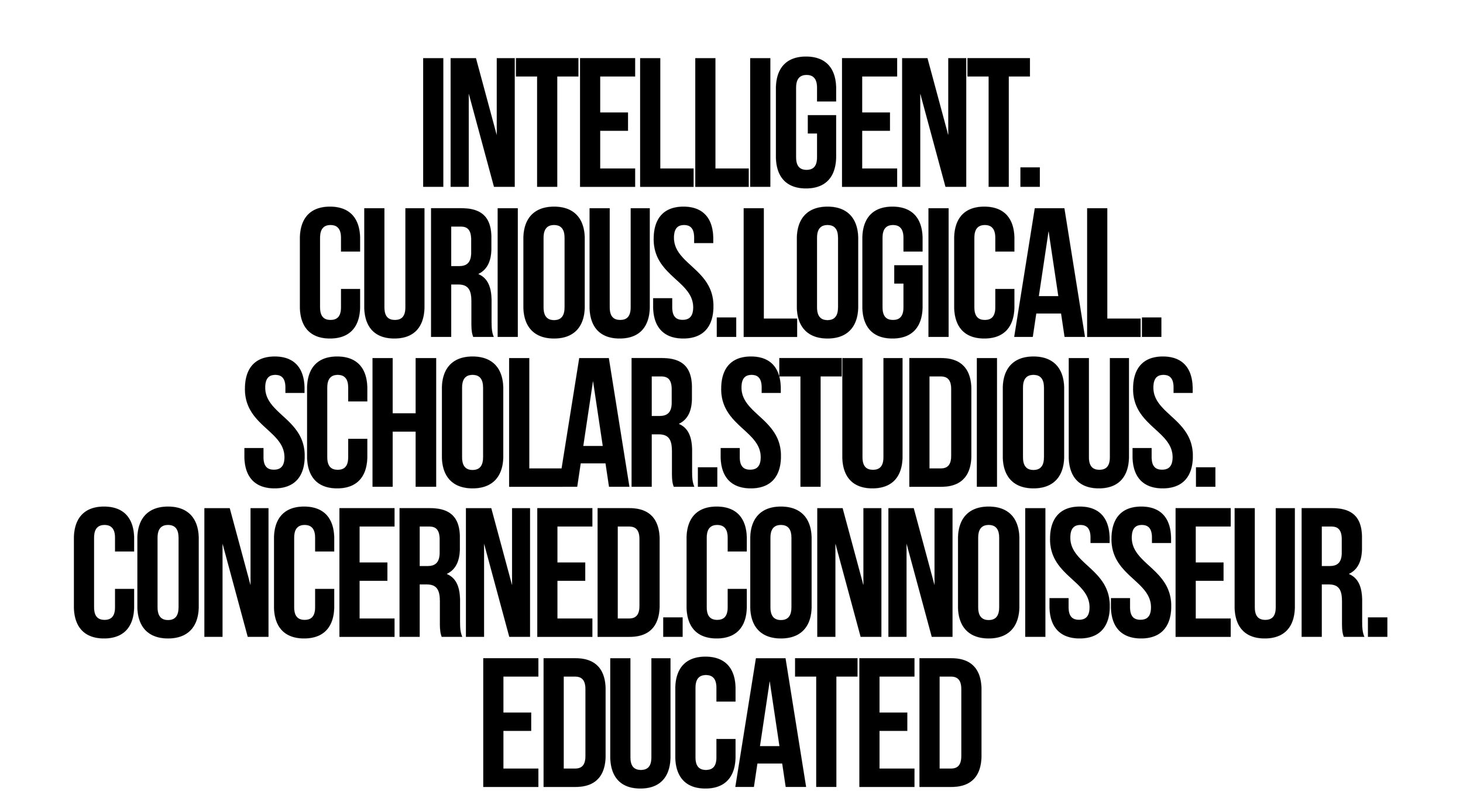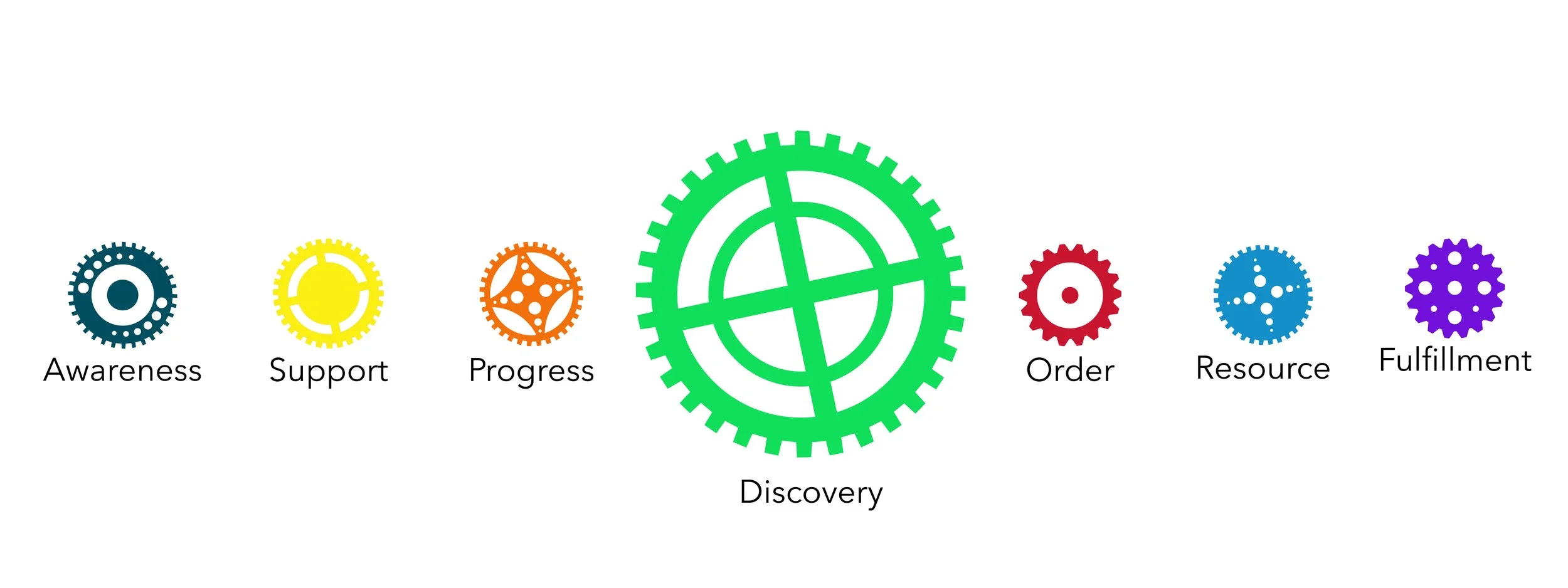THE IDENTIFIER | ESSENTIAL

DESIGN PROFILE
CONCEPTUAL DESIGN
You have a Conceptual Design.

PROFILE
con·cep·tu·al
/kənˈsepCH(əw)əl/
Defining conceptual
Conceptual thinking allows us to explore and understand abstract ideas, diving deep into the hidden principles that govern life and systems. It goes beyond surface-level understanding, embracing complexity and nuance in search of deeper meaning. Conceptual individuals have an intuitive grasp of patterns and connections allowing them to see relationships between seemingly unrelated ideas. This ability to think abstractly and holistically transcends facts and details, guiding us toward new insights and innovative solutions. Conceptual thinking opens doors to intellectual exploration, where the unknown becomes a canvas for discovery. It is the quiet, persistent search for understanding that pushes the boundaries of what we know, revealing deeper truths and hidden pathways within the complexity of life.
LEARN MORE ABOUT MOTIVATIONAL DESIGN
Core Traits
Words that describe those with the Conceptual Design:
Your conceptual design is defined by intellectual curiosity, speculative insight, and imaginative depth. You are a natural explorer of thought, drawn to the edges of what is known and what could be. Endlessly inquisitive, you investigate ideas not just for understanding, but for transformation—seeking to reimagine what’s possible through creative frameworks and innovative thinking. Your unique ability to merge logic with imagination empowers you to generate original concepts that are both visionary and grounded in analytical rigor.
In any setting where thought and innovation intersect, you thrive. You bring new perspectives to the table, offering fresh lenses to age-old questions. You’re not satisfied with superficial answers; instead, you pursue the principles beneath the surface, craving insight that expands both your mind and your impact.
-
Your dual capacity for creativity and critical thought positions you as a remarkable problem-solver. You don’t just ideate—you refine. Your mind quickly maps possibilities, identifies structural gaps, and explores uncharted territory, making you a catalyst for discovery. You often construct new theories, methodologies, or systems, building bridges between complexity and clarity.
But this gift can also become a burden. Your thinking can spiral into abstraction, making it difficult to communicate your ideas with simplicity. You may find that while your vision is profound, it becomes inaccessible to others unless you intentionally streamline your message. Cultivating clarity in your communication will ensure that your ideas resonate and inspire action.
-
You take pride in the originality and depth of your thought—and rightfully so. Yet your confidence in your intellectual abilities can sometimes evolve into a quiet resistance to collaboration. When others fail to grasp your concepts or offer surface-level thinking, you may instinctively retreat or dismiss their input. This can inadvertently isolate you or create rifts in your relationships.
At times, you may lean into confirmation bias, unconsciously favoring ideas that reflect your worldview. But your best insights come when you allow your frameworks to be challenged. By welcoming intellectual friction and surrounding yourself with diverse thinkers, you sharpen your concepts and enrich your perspective.
-
While your mind races with ideas, your actions can be restrained by hesitation. Your strong preference for perfection and thoroughness often slows your willingness to take risks. You may sit on revolutionary ideas, waiting for the “perfect” conditions before acting—missing out on timely opportunities in the process.
This caution sometimes masks deeper self-doubt. Despite your intellect, you may quietly seek validation or worry your ideas won’t be received with the weight they deserve. Building trust in your own voice and learning to take small, courageous steps toward implementation will bring your concepts to life and build momentum in your journey.
-
Your layered mental process is one of your greatest strengths—but it can also complicate your message. You may naturally construct intricate models and nuanced frameworks that are difficult for others to follow. In your quest to express the full picture, you risk overwhelming your audience and undercutting the clarity of your insight.
When you simplify without sacrificing substance, your ideas become transformative. Learning to distill your thought process into clear, actionable expressions will allow others to engage with your vision and rally behind your ideas.
-
When immersed in conceptual exploration, you may lose awareness of practical realities. Your ability to think expansively can draw you into a world of internal wonder, sometimes at the expense of immediate tasks or interpersonal connections. While this depth fuels your innovation, anchoring your thoughts in action and empathy ensures your ideas make a tangible difference.
By grounding your mental pursuits in collaboration and purpose, you can transform complex insights into meaningful, real-world solutions—building systems, tools, and innovations that shape the future.
-
In summary, your conceptual design is a wellspring of innovation, insight, and intellectual vision. You are at your best when imagining what others cannot yet see and crafting solutions that challenge convention. By embracing simplicity, openness, and risk, you will not only elevate your thinking—but also bring your extraordinary ideas into full expression. You are not just a thinker or dreamer—you are a designer of the future, and the world needs what only you can imagine and build.
who am I.
I am logical + curious + smart + literal + scholarly + imaginative + objective
You are a thinker in the truest sense of the word—logical, precise, and endlessly curious. Your mind is always turning, not just processing the world as it is, but probing it for deeper meaning. You’re the kind of person who doesn’t take things at face value. You ask questions, not to challenge for the sake of it, but because you have to understand. You dissect information like a scholar, looking for patterns, principles, and truths that others skim past. Your intelligence is sharp, but not showy. It's rooted in your need to understand the architecture behind ideas—the mechanisms that hold everything together.
Literal by nature, you prefer clarity over confusion, precision over poetic fluff. You don't dance around meaning—you go straight to the heart of it. Yet within that clarity lies imagination. You don’t just analyze—you envision. You see the possibilities behind systems, the unseen links between ideas, the “what ifs” hidden in the obvious. You hold objectivity like a compass, keeping your judgment steady, even when others are swayed by emotion or bias. It’s not that you’re detached—you simply believe that truth deserves a clear lens. At your core, you're a seeker—of knowledge, of structure, of truth. And you don’t just want to understand the world. You want to make sense of it.
What I need + want
I need to get the facts + share what I have learned + time to think & weigh the pros and cons + A good debate or discussion
You need the facts—plain and unfiltered. Surface-level answers won’t satisfy you, because you're wired to go deeper, to strip away the layers until you find what’s actually real. Information isn’t just useful to you; it’s vital. You don’t just consume knowledge—you test it, question it, weigh it against experience. And once you’ve sorted through the noise and arrived at clarity, there’s a deep pull to share it. You want others to understand, to see what you see. Teaching, explaining, clarifying—it’s not just a task, it’s part of how you process truth and anchor it more deeply in your own understanding.
You need time—quiet, uninterrupted space to think, to break things down, to sort through complexity with a clear head. You don’t rush your conclusions, because what matters to you isn’t just making a decision—it’s making the right one. Pros and cons, possibilities and pitfalls—you want to weigh it all before you move. And while you value solitude, you come alive in a good debate. A meaningful discussion sharpens your thoughts, challenges your perspective, and lets you stretch your thinking in real-time. You don’t argue to win—you engage to learn, to refine, and to get closer to the truth. For you, the process of thinking is the path forward.
You need to get the facts—real facts, not opinions or vague assumptions. Clarity is essential for you. You don’t like to move without understanding, and you won’t make decisions based on guesswork. You need information that holds up, insight that’s rooted in reality, and time to explore what’s actually true. You’re a seeker by nature—of principles, patterns, and the hidden logic behind how things work. And once you've learned something valuable, you feel a natural pull to share it. You don’t hoard knowledge—you offer it. Because part of your purpose is helping others see what they couldn’t on their own.
You need space to think—mental breathing room to step back, process, and work things through. You don’t like to be rushed into decisions. You want to weigh the pros and cons, test possibilities, and move forward with confidence, not chaos. And you love a good debate or discussion—not for the conflict, but for the clarity it brings. Iron sharpens iron. You think best in conversation, especially when others are equally thoughtful and open. For you, dialogue isn’t about winning—it’s about refining. You don’t just want to act—you want to understand. Because when you understand, you move with power.
Do you have any more come to mind?
What I love + like
I love reading + researching+fact checking.discussing & debating.context.history. the science behind everything
You love knowledge—not just as information, but as a living, evolving landscape to explore. Reading is your gateway, your favorite form of travel, allowing you to step into ideas, times, and minds beyond your own. Researching feels natural to you; it’s not a task but a kind of discovery, a process where scattered pieces begin to form a whole. You don’t just accept information—you verify it. Fact-checking is your way of honoring the truth, protecting what’s real from being twisted or misused. There’s a satisfaction you find in accuracy, in knowing that what you hold is solid and not just noise dressed as knowledge.
You love the art of discussion—the way ideas stretch and sharpen when exchanged with others. Debate energizes you, not because you're looking to win, but because the push and pull of perspective helps refine what’s true. You’re drawn to context: the background, the history, the layers that give depth and meaning to what most people overlook. You want to know not just what something is, but why it is, how it came to be, and what it means in the bigger picture. Science, with its precision and curiosity, feels like home to you—it's the ultimate map for decoding the world. At your core, you don’t just want answers—you want understanding that lasts.
Can you think of anymore?
What I dislike + hate
I hate when people don’t know what they are talking about + manual labor + guessing at the unknown + being forced to make decison without all of the facts.
You hate when people speak without understanding—when confidence outruns competence and opinions are thrown around without substance. It grates against everything in you that values depth, accuracy, and integrity of thought. You don’t mind being proven wrong, but you do mind when people don’t care whether they’re right. Shallow thinking and half-baked conclusions make it hard for you to stay present, because you can feel the cracks in logic before the rest of the room even notices. For you, words should be backed by knowledge, and actions should be rooted in understanding.
Manual labor frustrates you—not because you’re unwilling to work, but because repetitive tasks without intellectual challenge feel like a waste of your ability. You’re not built for the rote—you’re built for the refined. Guessing at the unknown makes your skin crawl. You want the data, the context, the backstory—the why—before you take action. Being forced to make decisions without all the facts is one of the most uncomfortable spaces you can be put in. It’s not indecision—it’s integrity. You don’t move blindly. You move with reason, and anything that denies you that process feels like a betrayal of your nature.
Do you have any more come to mind?
When I show up
I bring my mind+my questions+ my hunger to know and learn+My imagination
When you show up, you bring more than just your presence—you bring your mind, sharp and attentive, already in motion. You're not the type to enter a room passively; you arrive with questions, with purpose, with a need to understand what’s really going on beneath the surface. You’re not satisfied with what’s obvious. You want to know the “why,” the “how,” and the “what if”—not just to have answers, but to stretch the boundaries of what’s possible to know. Your hunger to learn is part of your DNA. It’s not about credentials or showing off—it’s about satisfying that deep inner drive to figure things out.
And woven through all of that is your imagination—a quiet, powerful force that colors how you see and connect the world. You’re not just collecting knowledge; you’re reshaping it, combining it, letting it evolve into new ideas and possibilities. You can look at a problem and imagine five different angles no one else thought of. You show up with vision, with depth, with the kind of curiosity that makes ideas come alive. You don’t just think—you wonder. And in doing so, you invite others to think differently too.
A closer look at your perspective, values, and approach to life.
Taking a closer look at your perspective, values and approach to life reveals how they shape your decisions and interactions with others. Understanding these core elements can provide clarity on what motivates you and guides your actions. This introspection can help align your choices with your true self, leading to a more fulfilling and authentic life.
click + expand
-
Curiosity-Fueled Vision: You see the world as a vast landscape of questions waiting to be answered. Your insatiable curiosity drives you to explore, investigate, and understand the underlying principles of everything around you. You believe that every question holds the potential for discovery and innovation. This mindset keeps you perpetually engaged and excited about learning new things.
Exploration of Possibilities: You perceive endless possibilities and believe that there is always more to discover. This perspective pushes you to look beyond the obvious and delve deeper into concepts and ideas, seeking to uncover hidden truths and connections. You approach problems and projects with a sense of wonder and anticipation for what you might uncover.
Emphasis on Learning: You view life as a continuous learning journey. Every experience, whether success or failure, is an opportunity to gain knowledge and insights. This perspective keeps you open-minded and adaptable, always ready to learn something new. You thrive on the process of acquiring and integrating new information.
Analytical Mindset: You approach the world with an analytical mindset, breaking down complex problems into manageable parts. This allows you to understand intricate systems and processes, leading to more effective and innovative solutions. You excel at identifying patterns and making connections that others might miss.
Future-Oriented Thinking: Your perspective is geared towards the future, constantly considering how current discoveries can shape and improve tomorrow. This forward-thinking approach helps you stay ahead of trends and anticipate future needs and opportunities. You are driven by the potential impact of your work on the future.
-
Curiosity: You highly value curiosity, seeing it as the driving force behind discovery and innovation. This value keeps you engaged and motivated to explore new ideas and concepts, believing that curiosity leads to deeper understanding and breakthroughs. Curiosity fuels your passion for learning and exploring the unknown.
Knowledge: The pursuit of knowledge is central to your values. You believe that accumulating knowledge is essential for personal and professional growth, and you actively seek out new information and learning opportunities. Knowledge empowers you to make informed decisions and contribute meaningfully to your field.
Open-Mindedness: You value open-mindedness and the willingness to consider different perspectives and ideas. This value allows you to embrace new concepts and adapt to changing circumstances, fostering a flexible and innovative mindset. Open-mindedness helps you stay adaptable and resilient in the face of change.
Critical Thinking: Critical thinking is a core value, that enables you to evaluate information and arguments rigorously. You believe that questioning assumptions and analyzing evidence is essential for making informed decisions and developing effective solutions. Critical thinking ensures that your conclusions are well-founded and reliable.
Innovation: You prioritize innovation and the creation of new and better ways to approach problems. This value drives you to challenge the status quo and seek out novel solutions that can lead to significant advancements. Innovation is the key to staying ahead and making a lasting impact in your field.
-
Embrace of Discovery: Your approach to life revolves around the pursuit of discovery and knowledge. You are driven by the excitement of uncovering new information and solving complex problems. This approach keeps you engaged and motivated in all your endeavors.
Learning Through Experience: You believe that every experience offers valuable lessons. Your approach involves actively seeking out new experiences and reflecting on them to extract insights and understanding. This continuous cycle of learning helps you grow and adapt over time.
Open to New Ideas: You maintain an open mind and are always ready to consider new perspectives and ideas. This approach allows you to innovate and find unique solutions to problems. Your willingness to embrace change and uncertainty is a key aspect of your life strategy.
Analytical and Reflective: You combine analytical thinking with reflective practice, constantly evaluating your actions and decisions. This approach helps you refine your methods and improve your effectiveness over time. You value the process of self-assessment and continuous improvement.
Vision for the Future: You are driven by a vision for the future and the impact your discoveries can have. This approach helps you stay focused on long-term goals and motivates you to keep pushing forward. Your ability to think ahead and anticipate future needs is a guiding force in your life.
-
Exploratory Engagement: You engage with the world by constantly exploring new ideas and possibilities. Your inquisitive nature drives you to seek out new information and experiences, keeping you at the forefront of innovation. This exploratory approach allows you to discover novel solutions and opportunities.
Collaborative Learning: Building and leveraging a strong network of contacts and collaborators is essential. By working with diverse teams and leveraging collective knowledge, you enhance your understanding and create more robust solutions. Collaboration enriches your work and leads to more comprehensive and effective outcomes.
Reflective Practice: You engage in regular reflection to evaluate your ideas and strategies. This reflective practice helps you to learn from experiences and refine your approaches, ensuring continuous improvement. By taking time to reflect, you gain deeper insights and make more informed decisions.
Multidisciplinary Interaction: You engage with a wide range of disciplines to gain a holistic understanding of complex issues. This multidisciplinary interaction broadens your perspective and enhances your ability to create comprehensive solutions. You value insights from various fields and integrate them into your work.
Adaptable Approach: You approach the world with a focus on long-term planning and sustainability. This future-oriented mindset helps you to anticipate challenges and opportunities, allowing you to develop strategies that are resilient and forward-thinking. By planning ahead, you ensure that your work remains relevant and impactful.
-
Problem-Solving: You tackle problems by considering all possible angles and integrating diverse perspectives. Your approach is systematic and thorough, ensuring that solutions are well-rounded and effective. You use creative thinking to develop innovative solutions that address the root causes of issues.
Communication: Your communication style is clear, articulate, and often visionary. You effectively convey complex ideas and concepts, ensuring that others understand your perspective and goals. You use storytelling and visualization to make your ideas more accessible and engaging.
Leadership: As a leader, you inspire others with your visionary ideas and creative approaches. You foster an environment that encourages innovation and open-mindedness, allowing your team to explore new possibilities and think outside the box. Your leadership style is collaborative and inclusive, promoting a culture of continuous learning and growth.
Development: Personal and professional growth is a continuous journey for you. You actively seek out new knowledge and skills, staying curious and open to new experiences. You engage in lifelong learning and encourage others to do the same, fostering a culture of development and improvement.
Modeling Success: You study successful individuals and practices, adapting them to your unique context. By learning from the successes of others, you create a roadmap for your own achievements. You integrate best practices and innovative approaches, continuously refining your methods to achieve optimal results.
Emotional Landscape
Let’s take a look at the way you experience different emotions based on your design.
General Emotions we everyone experiences
-
Definition: For conceptual designs, love is an intellectual and emotional bond characterized by mutual respect, shared ideas, and deep understanding.
Experience: You experience love when you connect with someone who appreciates your innovative thinking and engages in stimulating conversations with you.
Reason: You experience love when you encounter individuals who share your intellectual curiosity and passion for exploring new ideas, making you feel understood and valued.
Message: Love tells you that your ideas and perspectives are appreciated and that you have found someone who values your unique way of thinking.
Example: You might feel deep love for a partner who engages in thoughtful discussions about your creative projects and supports your intellectual pursuits.
-
Definition: For conceptual designs, joy is a sense of fulfillment and enlightenment that comes from discovering new ideas, solving complex problems, and achieving intellectual growth.
Experience: You feel joy when you uncover a new concept, solve a challenging problem, or achieve a breakthrough in your creative work.
Reason: You experience joy from the sense of intellectual accomplishment and the excitement of discovering something new.
Message: Joy tells you that your creativity and problem-solving skills are leading to meaningful achievements, motivating you to continue exploring and innovating.
Example: You might feel joy when you develop a new theory or create a unique piece of art that captures your innovative ideas.
-
Definition: For conceptual designs, sadness is a feeling of loss or disappointment, often related to unachieved intellectual goals or the inability to express your creativity effectively.
Experience: You experience sadness when your creative efforts don't lead to the desired outcomes, or when you feel disconnected from your intellectual pursuits.
Reason: You experience sadness because your intellectual efforts and creative achievements are a significant part of your identity and purpose.
Message: Sadness tells you to reflect on what went wrong, understand the reasons behind the loss, and find ways to reconnect with your creative passions.
Example: You might feel sadness when a long-term research project fails to yield significant results, or when you have to abandon a creative idea due to lack of support.
-
Definition: For conceptual designs, anger is felt as a disruption to your intellectual harmony and understanding, often triggered by ignorance, closed-mindedness, or stifling of creativity.
Experience: You feel anger when your ideas are dismissed, when you encounter resistance to innovation, or when you face situations that limit your intellectual freedom.
Reason: You experience anger because these disruptions challenge your need for intellectual exploration and creativity.
Message: Anger tells you that something is hindering your intellectual growth, prompting you to address the issue and seek a resolution.
Example: You might feel anger when a colleague dismisses your innovative ideas without consideration or when bureaucratic obstacles prevent you from pursuing a creative project.
-
Definition: For conceptual designs, shame is a feeling of inadequacy or failure when your ideas don't meet your own high standards or those of others.
Experience: You experience shame when your creative efforts fall short, when you make intellectual errors, or when your ideas are not well-received.
Reason: You experience shame because your identity and self-worth are closely tied to your intellectual and creative achievements.
Message: Shame tells you to reflect on your efforts, learn from your mistakes, and strive to improve your ideas and presentations.
Example: You might feel shame when a research paper you submitted is rejected or when a creative project fails to resonate with your audience.
-
Definition: For conceptual designs, peace is a state of intellectual clarity and harmony achieved through understanding complex systems and aligning your ideas with your goals.
Experience: You experience peace when you have a clear understanding of a concept, system, or situation, and feel that your creative ideas are well-organized and purposeful.
Reason: You experience peace when your thoughts and ideas are coherent and aligned, reducing mental clutter and confusion.
Message: Peace tells you that your intellectual efforts are leading to clarity and harmony, encouraging you to continue refining and organizing your ideas.
Example: You might feel peace after successfully organizing your research notes or outlining a detailed plan for a new project.
-
Definition: For conceptual designs, confidence is rooted in your trust in your intellectual abilities and creative insights.
Experience: You feel confident when you have a strong understanding of a subject, and your creative ideas are validated by others or proven successful.
Reason: You experience confidence from your ability to generate innovative solutions and effectively communicate your ideas.
Message: Confidence tells you that your intellectual efforts are valuable and encourages you to take on new challenges and share your insights.
Example: You might feel confident when presenting your research findings at a conference or leading a creative brainstorming session.
-
Definition: For conceptual designs, fear is the anticipation of intellectual failure or the inability to generate innovative ideas and solutions.
Experience: You feel fear when facing new intellectual challenges, when your ideas are not fully developed, or when you doubt your creative abilities.
Reason: You experience fear because unpredictability and potential failure threaten your sense of intellectual competence and creativity.
Message: Fear tells you to prepare thoroughly, seek information, and refine your ideas to mitigate risks and uncertainties.
Example: You might feel fear when starting a new research project that requires skills you haven't fully developed or when presenting your ideas to a critical audience.
Unique Emotions for conceptual Designs
-
Definition: Conceptual clarity is a profound sense of understanding and satisfaction that arises when abstract ideas and concepts coalesce into a clear, coherent vision or solution.
Experience: You experience conceptual clarity when previously scattered or complex ideas suddenly make sense, forming a comprehensive and understandable whole that can be communicated and applied effectively.
Reason: You experience conceptual clarity because it aligns with your intrinsic motivation to make sense of the abstract and transform complex ideas into practical applications.
Message: Conceptual clarity motivates you to continue seeking deeper understanding and refining your ideas, ensuring that your concepts are both innovative and actionable.
Example: You might feel conceptual clarity when a breakthrough idea suddenly connects all the dots in your research, when a complex problem is distilled into a simple solution, or when you can clearly articulate a novel concept to others.
-
Definition: Reflective insight is a deep, contemplative feeling that arises from reviewing and understanding past intellectual explorations and their outcomes, leading to personal and professional growth.
Experience: You experience reflective insight when looking back on your past ideas and projects, understanding what worked, what didn’t, and why, and gaining valuable lessons for future endeavors.
Reason: You experience reflective insight because continuous learning and refinement of concepts are integral to your design, helping you evolve and improve your innovative thinking.
Message: Reflective insight motivates you to continuously analyze and learn from your experiences, fostering growth and enhancing your future creative endeavors.
Example: You might feel reflective insight when conducting a post-mortem analysis of a project, when revisiting old ideas with a fresh perspective, or when extracting valuable lessons from both successes and failures.
-
Definition: Intellectual satisfaction is the deep sense of fulfillment and contentment that comes from solving complex problems, understanding intricate concepts, and achieving intellectual breakthroughs.
Experience: You experience intellectual satisfaction when you solve a challenging problem, develop a novel concept, or achieve a deep understanding of a complex subject.
Reason: You experience intellectual satisfaction because your primary drive is centered on exploration and discovery, and solving problems and developing new ideas is a core aspect of your identity.
Message: Intellectual satisfaction reinforces the value of your intellectual pursuits and encourages you to continue challenging yourself with complex and innovative problems.
Example: You might feel intellectual satisfaction when your innovative solution to a problem is implemented successfully, when you publish a groundbreaking research paper, or when you explain a complex idea clearly and effectively to others.
-
Pedagogical Inspiration
Definition: Pedagogical inspiration is a feeling of excitement and motivation that comes from teaching and sharing knowledge with others, seeing them grasp and apply new concepts.
Experience: You experience pedagogical inspiration when explaining ideas, mentoring others, or witnessing moments of understanding and inspiration in those you teach.
Reason: You experience pedagogical inspiration because sharing knowledge and fostering understanding in others aligns with your desire to illuminate and clarify complex concepts.
Message: Pedagogical inspiration encourages you to continue teaching and sharing your knowledge, recognizing the impact you can have on others' intellectual growth.
Example: You might feel pedagogical inspiration when a student or colleague has a breakthrough moment, when your explanations help someone understand a difficult concept, or when your teaching leads to significant learning outcomes.
-
Definition: Analytical persistence is a feeling of determination and resolve that arises from the process of refining experiments, overcoming failures, and rigorously testing hypotheses.
Experience: You experience analytical persistence when your experiments face challenges, when initial results are inconclusive, and when you need to iterate and refine your approach.
Reason: You experience analytical persistence because rigorous experimentation and analysis are critical to validating new ideas and concepts, even when the process is challenging.
Message: Analytical persistence encourages you to remain steadfast in your experimental efforts, recognizing that persistence and refinement are essential to achieving reliable results and breakthroughs.
Example: You might feel analytical persistence when an experiment doesn't go as planned and requires troubleshooting when you have to repeat tests to confirm results, or when overcoming setbacks leads to eventual success.
-
Definition: Experimental joy is the feeling of happiness and excitement that arises from engaging in hands-on experimentation, testing new ideas, and discovering new phenomena.
Experience: You experience experimental joy when you set up and conduct experiments, when you observe and record results, and when your hands-on activities lead to new insights.
Reason: You experience experimental joy because the process of experimenting aligns with your drive to explore, discover, and validate new concepts.
Message: Experimental joy encourages you to continue engaging in experimental activities, recognizing that hands-on exploration is a key pathway to discovery.
Example: You might feel experimental joy when your experiments yield surprising results, when a new method you test proves effective, or when you make an unexpected discovery during an experiment.
-
Definition: Conceptual triumph is a profound sense of achievement and validation that arises from successfully developing and implementing a new concept that proves to be impactful and valuable.
Experience: You experience conceptual triumph when your innovative ideas are successfully realized, when they are adopted by others, or when they lead to significant advancements.
Reason: You experience conceptual triumph because seeing your concepts come to fruition and make an impact validates your intellectual efforts and creativity.
Message: Conceptual triumph encourages you to keep innovating and developing new ideas, recognizing the value and impact of your creative contributions.
Example: You might feel conceptual triumph when your new product design is successfully launched, when your innovative research is published and cited, or when your concept leads to a breakthrough in your field.
-
Definition: Inspirational awe is a profound sense of wonder and excitement that arises from envisioning novel ideas, innovative concepts, and imaginative possibilities.
Experience: You experience inspirational awe when your imagination sparks new ideas, when you see potential in uncharted territories, or when your creative thinking leads to groundbreaking concepts.
Reason: You experience inspirational awe because your drive to explore and innovate is deeply connected to your ability to imagine and envision the future.
Message: Inspirational awe encourages you to embrace your creative imagination, continually exploring new ideas and pushing the boundaries of conventional thought.
Example: You might feel inspirational awe when conceptualizing a new invention, when a brainstorming session leads to a revolutionary idea, or when visualizing the impact of your creative work.
"Exploration is your art form, and each concept you uncover adds another brilliant stroke to the masterpiece of human understanding."
WATCH THE FULL VIDEO
Discovery
READ ALONG | JUST LISTEN
Conceptual designs are driven by the motivational drive of Discovery, which centers on exploration, learning, and uncovering new insights. For individuals with a Conceptual design, understanding the world through deep inquiry and intellectual curiosity is not merely an interest but a defining purpose. The Discovery drive shapes their approach to knowledge, motivating them to question assumptions, seek clarity, and build a foundation of well-founded understanding that can be shared and applied.
-
In a Conceptual design, the Discovery drive establishes a relentless focus on intellectual pursuit and exploration. Individuals with this drive are naturally curious, viewing every idea, theory, or observation as an opportunity to deepen their understanding. Discovery is the force that pushes them beyond the surface, encouraging them to analyze, investigate, and uncover hidden truths. This drive gives Conceptual individuals a sense of purpose, as they view knowledge as an evolving field where continuous learning leads to ever-greater clarity and insight.
-
Driven by Discovery, Conceptual individuals possess a profound curiosity and a desire to explore uncharted territories of thought. They are drawn to complex ideas, abstract concepts, and challenging questions, seeing each as a doorway to greater knowledge. For them, curiosity is a motivating force that drives them to dig deeper, seek out new perspectives, and approach problems with an open mind. This intellectual exploration is both a means and an end in itself, as they find fulfillment in the journey of learning.
-
The Discovery drive instills an analytical and inquisitive mindset in those with a Conceptual design. They are not satisfied with superficial explanations or assumptions; instead, they prefer to break down ideas and examine each component. This analytical approach enables them to assess information critically, identifying underlying patterns, principles, and connections. Their inquisitive nature leads them to constantly ask “why” and “how,” as they strive to build a robust and well-rounded understanding of any topic they encounter.
-
Conceptual individuals, guided by Discovery, place a high value on knowledge and theoretical depth. They are motivated by the desire to understand the foundational principles that shape how things work. This focus on depth means they are often drawn to research, philosophy, science, or other fields where inquiry and knowledge-building are central. For them, knowledge is not just about gathering facts; it is about creating a cohesive understanding that can be refined, expanded, and shared with others.
-
For Conceptual designs, fulfillment comes from the process of uncovering truths and making meaningful discoveries. They find satisfaction in revealing new insights, whether it’s understanding a complex topic, solving a challenging problem, or identifying an overlooked connection. Fulfillment is rooted in the belief that knowledge has intrinsic value and that uncovering hidden truths contributes to a richer, more accurate understanding of the world. This motivation drives them to continually seek out knowledge, seeing discovery as both personally satisfying and valuable to society.
-
The Discovery drive in Conceptual designs cultivates patience and a strong attention to detail. Conceptual individuals understand that true discovery often requires time, thorough investigation, and careful analysis. They are willing to invest the time needed to explore a topic fully, ensuring that they have a comprehensive understanding before drawing conclusions. This patience allows them to remain focused even on complex or abstract topics, as they appreciate the meticulous process of inquiry as much as the insights that result.
-
Those with a Conceptual design are committed to intellectual integrity, driven by the Discovery motive to prioritize truth over convenience. They value accuracy and depth, and they hold themselves to high standards in their pursuit of knowledge. This commitment means they are skeptical of ideas taken at face value, preferring instead to verify and validate information through critical examination. Intellectual integrity gives them credibility and respect in fields where thoroughness and honesty in inquiry are paramount.
-
The Discovery drive in Conceptual designs encourages individuals to not only seek understanding but also to find practical applications for their insights. They are motivated by the idea that knowledge should be shared, applied, and used to solve real-world problems. This practical perspective allows them to translate their discoveries into actionable insights, making them valuable contributors in fields that benefit from innovative thinking and problem-solving. They see their discoveries as stepping stones toward broader understanding and as tools for positive change.
-
Conceptual individuals also find purpose in inspiring curiosity and intellectual engagement in others. The Discovery drive motivates them to share what they learn, sparking curiosity and encouraging others to think critically. They believe that a shared pursuit of knowledge benefits everyone, and they are often skilled at explaining complex ideas in accessible ways, making discovery a communal endeavor. By fostering an environment where curiosity and questioning are valued, they create spaces where others feel encouraged to explore new ideas.
Discovery defines the Conceptual motivational design by driving individuals to pursue knowledge, analyze information critically, and uncover hidden truths. Through curiosity, intellectual integrity, and a passion for theoretical depth, Conceptual individuals create a life filled with learning and meaningful insight. This approach allows them to fulfill their core purpose of understanding, expanding, and sharing knowledge, ultimately contributing to a deeper, more accurate view of the world. The Discovery drive shapes their commitment to exploration and rigorous inquiry, making them lifelong seekers of truth and insight.
Conceptual Design
"It takes a brave mind to question the narrative and seek the facts; your dedication to unearthing what’s genuine ensures that knowledge prevails over assumption."
WATCH THE FULL VIDEO
READ ALONG | JUST LISTEN
snapshot
You are a source of groundbreaking ideas, known for your creative, outside-the-box thinking and comfort with ambiguity. With a strong strategic vision, you excel at developing long-term plans and anticipating future challenges. Your skills in complex problem-solving allow you to break down intricate issues and provide holistic solutions. As a thought leader, you inspire others to think deeply, pushing teams or organizations toward new directions. You’re adept at synthesizing knowledge from diverse fields, creating unique insights, and your intellectual flexibility makes you highly adaptable to change, open to evolving ideas and embracing new perspectives.
breakdown
click + expand
-
You are often the source of groundbreaking ideas, new strategies, and original approaches. Your ability to think outside the box and your comfort with ambiguity allow you to generate innovative solutions that challenge conventional thinking. You’re particularly adept at synthesizing new ideas from diverse sources, creating entirely new frameworks or theories.
-
You excel at creating strategies that extend far into the future. You can foresee the implications of decisions, actions, and ideas well before they materialize, enabling you to guide teams, organizations, or projects toward long-term success. Your visionary nature allows you to anticipate challenges and opportunities, making you an effective strategic planner.
-
You tackle multi-layered, complex problems with ease. Comfortable with uncertainty, you break down intricate systems into their component parts to understand and address root issues. Your ability to approach problems from multiple angles ensures that your solutions are holistic and well-considered.
-
You have a natural ability to inspire others with your ideas and insights. Whether in academic, corporate, or creative settings, you often emerge as a thought leader, encouraging others to think more deeply and expansively. Your intellectual rigor and innovative thinking push teams or organizations in new directions and elevate collective understanding.
-
You excel at gathering information from a variety of fields, disciplines, or sources and synthesizing it into cohesive, original ideas. Your ability to see connections across seemingly unrelated areas allows you to create insights that others might not immediately recognize.
-
Your intellectual flexibility allows you to adapt to new information, changing environments, or unexpected challenges. Rather than clinging to established thinking, you’re open to evolving your ideas based on new evidence or perspectives, making you highly adaptable in dynamic fields.
READ ALONG | JUST LISTEN
snapshot
You may excel at idea generation but struggle with execution, as it’s easy to get absorbed in abstract thinking and lose sight of necessary details. This can lead to frustration when ideas aren’t realized or lack operational support. A tendency toward overthinking can result in analysis paralysis, slowing progress and potentially missing opportunities. Sometimes, your focus on big ideas may disconnect you from practical, immediate needs, causing friction with others who prioritize actionable steps. Routine tasks can feel uninspiring, leading to difficulties in consistent follow-through. You may also experience intellectual isolation, as finding others who share your depth of curiosity can be challenging. Impatience may arise when others don’t fully grasp the complexity of your ideas or focus on surface-level practicalities.
breakdown
click + expand
-
While you excel at generating ideas, you may struggle with the practical aspects of executing them. It’s easy for you to become so absorbed in abstract thinking or planning that you lose sight of the details needed to bring your vision to life. This can lead to frustration if your ideas aren’t realized or if you lack partners who can handle operational aspects of your plans.
-
Naturally inclined to explore all facets of a problem, you may find it challenging to make decisions or move forward without fully analyzing each possibility. This tendency toward overthinking can slow progress or lead to missed opportunities as you struggle to reach a conclusion.
-
You may sometimes become disconnected from the practical realities of a situation. Your focus on abstract ideas or long-term visions can cause you to overlook immediate needs or constraints, leading to frustration for others who are more focused on short-term, actionable steps.
-
Mundane, repetitive tasks may bore you, as they don’t engage your intellectual faculties. You may struggle to maintain consistency in areas that require steady, detailed work, preferring instead to focus on big ideas or theoretical exploration. This can lead to issues with task completion or follow-through on smaller aspects of a project.
-
Due to your love of abstract thinking and independent exploration, you may experience intellectual isolation. It can be challenging to find others who share your depth of curiosity or specific intellectual interests, leading to feelings of isolation or frustration in group settings where your ideas aren’t fully understood or appreciated.
-
You may sometimes grow impatient with people who don’t immediately grasp the depth or complexity of your ideas. It can be frustrating when others don’t share your enthusiasm for intellectual exploration or when discussions focus too much on practicalities or surface-level thinking.
READ ALONG | JUST LISTEN
snapshot
To optimize your strengths, balance ideation with execution by partnering with practical-minded colleagues to bring your ideas to life. Streamline decision-making by setting criteria and trusting your instincts to avoid analysis paralysis. Ground your theories in practical applications to make your insights actionable and stay engaged with routine tasks. Diversify intellectual engagement through interdisciplinary projects to keep ideas fresh and inspiring. Develop communication skills to convey complex concepts clearly to different audiences. Finally, balance independence with collaboration by working with those who bring fresh perspectives and challenge your thinking, refining your ideas into stronger solutions.
breakdown
click + expand
-
You can benefit from partnering with others who excel at execution. Collaborating with practical-minded colleagues or team members can help ensure your ideas are implemented effectively. This also keeps you grounded and connected to the practical steps needed to bring your concepts to life.
-
To avoid analysis paralysis, develop strategies for making decisions more efficiently. Setting deadlines for choices or focusing on a minimum set of criteria can help you move forward without getting stuck in endless analysis. Trusting your instincts and experience can also support effective decision-making.
-
Increase the impact of your ideas by finding practical applications for your theories. By regularly connecting abstract thinking to real-world challenges, you can ensure your insights are actionable and relevant, which can help you stay engaged with more routine tasks.
-
You thrive when exploring multiple areas of interest. Engaging with interdisciplinary subjects or projects that allow exploration across intellectual fields keeps you motivated and inspired. Broadening your intellectual horizons also helps synthesize wider insights and keep ideas fresh.
-
Given your complex and nuanced ideas, you can benefit from honing clear, effective communication skills. Learning to simplify concepts or adjust your style for different audiences ensures your insights have a broader impact.
-
While you enjoy working independently, seek collaborators who challenge you and bring new perspectives. Engaging with others who can push your thinking or provide complementary skills helps you refine your ideas and create more robust solutions.
You thrive in roles that allow you to explore and innovate, such as research and development, where you can push knowledge boundaries in science, technology, or academia. Your long-term vision and big-picture thinking make you well-suited for strategic planning, guiding organizations toward sustainable success. In creative fields like writing, design, or film, you excel at crafting captivating worlds and systems. With a talent for thought leadership, roles in consulting, speaking, or authorship allow you to inspire others with your visionary ideas. For deep theoretical exploration, academia offers an ideal setting to contribute to fields like philosophy, sociology, or psychology.
Ideal roles
READ ALONG | JUST LISTEN
snapshot
Your strengths in exploration, vision, and creativity make you ideally suited for roles that involve innovation, long-term thinking, and intellectual rigor. In research and development, you excel by pushing boundaries and crafting pioneering solutions with lasting impact. Strategic planning roles benefit from your ability to see the big picture and chart sustainable paths forward, whether in business or public service. In creative industries like writing, design, or art, you bring fresh, captivating ideas that resonate with audiences. Your insight and visionary thinking also make you well-equipped for thought leadership roles in consulting, public speaking, or authorship, where you can inspire others with new frameworks and approaches. Lastly, academia offers a fulfilling path for you, allowing deep engagement with theoretical questions and the opportunity to contribute to fields such as philosophy, sociology, or psychology.
breakdown
click + expand
-
You thrive in roles where you can explore new ideas and push the boundaries of existing knowledge. In fields like scientific research, technology development, or academia, you can engage in deep theoretical exploration and create innovative solutions with far-reaching implications.
-
Your ability to think long-term and see the big picture makes you ideal for strategic planning roles. Whether in business, government, or nonprofits, you excel at developing future-oriented strategies that guide organizations toward sustainable success.
-
You flourish in creative industries such as writing, design, film, or art. Your ability to imagine new worlds, systems, and narratives enables you to innovate in ways that captivate and inspire audiences.
-
With your talent for generating new frameworks and insights, you are well-suited to roles requiring thought leadership. Whether as a consultant, keynote speaker, or author, you can inspire others with your visionary thinking and intellectual rigor.
-
For those deeply engaged with abstract or theoretical questions, academia is a natural environment for exploration. You can pursue advanced research, teach, and contribute to fields such as philosophy, sociology, or psychology.
You are characterized by intellectual curiosity, visionary thinking, and innovative problem-solving abilities. You excel in roles that allow you to explore abstract ideas, synthesize knowledge, and develop new theories or strategies. Your strengths lie in creative thinking, long-term vision, and complex problem-solving. However, you may face challenges in execution, overthinking, and staying focused on practical realities. By balancing ideation with actionable steps and collaborating with more practically-minded individuals, you can bring your visionary ideas to life and make a profound impact on the world around you.
Ideal environment
READ ALONG | JUST LISTEN
snapshot
Here’s a snapshot of environments that foster growth and engagement for individuals driven by intellectual curiosity, creativity, and visionary thinking. These settings each offer unique elements that encourage deep exploration, adaptability, and collaboration. In these environments, you can pursue complex challenges, connect with diverse perspectives, and express innovative ideas. Socially, they provide a dynamic community of like-minded individuals who value creativity, exploration, and interdisciplinary collaboration. Together, these aspects create a fulfilling space where you can align your work with long-term goals and continually refine your vision.
breakdown
click + expand
-
Description: In a stimulating, idea-focused environment, there is a shared enthusiasm for exploring theories, abstract concepts, and innovative solutions. This setting encourages intellectual curiosity, providing freedom to brainstorm, experiment, and discuss ideas openly. A space where ideas can flourish allows conceptual individuals to explore and refine new perspectives, theories, and possibilities.
Emotional Impact: You feel energized and engaged in an atmosphere that values intellectual curiosity and open-ended exploration. Having the freedom to explore ideas without immediate constraints or limitations allows you to dive deeply into subjects that spark your interest, enhancing your sense of purpose and fulfillment.
Social Dynamic: Surrounded by individuals who are equally passionate about ideas, you enjoy engaging in conversations and collaborative discussions. Socially, you thrive in a setting where colleagues are receptive to exploring complex ideas, creating a community where everyone values curiosity and shared intellectual growth.
-
Description: An environment that actively encourages innovation and experimentation invites you to test theories, approach problems creatively, and explore alternative solutions. This setting celebrates original thinking and supports trial and error as a means of discovery, fostering an atmosphere where new ideas are not only welcomed but encouraged.
Emotional Impact: You feel inspired and motivated in a space that values originality and the creative process. The opportunity to experiment without fear of judgment helps you feel confident and fulfilled, knowing that your unique perspective and ideas are respected. This encouragement to innovate gives you a sense of freedom, empowering you to pursue groundbreaking ideas.
Social Dynamic: Working with others who are open to creative exploration and value non-traditional approaches enhances your sense of connection. Socially, you thrive with colleagues who embrace trial and error, providing a supportive community that encourages risk-taking and celebrates each other’s insights and discoveries.
-
Description: A flexible, open-structure environment with adaptable workflows allows conceptual individuals to shift between projects and explore ideas as inspiration strikes. This setting reduces rigidity, allowing space to experiment with new approaches, collaborate on interdisciplinary teams, and integrate insights across projects.
Emotional Impact: You feel empowered in a flexible structure that adapts to your way of thinking, enabling you to work fluidly and without constraints. This adaptability fuels your creativity and motivation, as you feel supported to follow your intuitive flow without the confines of rigid schedules or hierarchical boundaries.
Social Dynamic: Being part of a team that values flexibility and open collaboration fosters a sense of camaraderie. Socially, you thrive with colleagues who also appreciate adaptable structures, creating a cooperative and respectful atmosphere where each person’s unique contributions are valued. Together, you can innovate more effectively, knowing there is mutual respect for diverse ways of working.
-
Description: An environment that provides ongoing intellectual challenges and complex problems to solve keeps you engaged and motivated. This setting often involves interdisciplinary projects, analytical discussions, and opportunities to apply theoretical knowledge in innovative ways, fostering a culture where deep thinkers can continually grow.
Emotional Impact: You feel deeply engaged and fulfilled in an intellectually stimulating environment that encourages continuous learning and exploration. Having the chance to tackle challenging issues allows you to dive deeply into complex topics, supporting your growth and satisfying your need for mental stimulation.
Social Dynamic: Working with colleagues who share your love for intellectual challenge creates a dynamic, vibrant social setting. Socially, you connect best with others who are also committed to expanding their knowledge and exploring ideas, leading to enriching conversations and mutual respect for each other’s expertise.
-
Description: An environment that values big-picture thinking and encourages you to envision future possibilities fosters a visionary mindset. This space emphasizes brainstorming and exploring grand ideas, whether for new projects, long-term goals, or transformative solutions. Conceptual individuals thrive when their long-term visions are respected and encouraged.
Emotional Impact: You feel validated and inspired in an environment that appreciates your ability to think beyond the present and envision what’s possible. Having the freedom to express and refine your ideas enhances your sense of purpose, empowering you to bring your visionary insights into reality.
Social Dynamic: Surrounded by others who are equally inspired by big ideas, you feel a strong sense of community. Socially, you connect well with those who respect and engage in forward-thinking conversations, creating an atmosphere that supports and celebrates creative ambition and intellectual exploration.
-
Description: An environment that encourages collaboration with individuals from diverse backgrounds and fields enriches your perspective. This setting allows you to draw from various disciplines, integrating ideas in innovative ways and refining your own theories through exposure to unique viewpoints.
Emotional Impact: You feel invigorated and fulfilled when surrounded by diverse thinkers, as each person’s insights contribute to your understanding. This diversity enriches your conceptual process, providing you with new angles to consider and increasing your sense of engagement and purpose.
Social Dynamic: Engaging with colleagues who offer diverse viewpoints creates a socially enriching atmosphere where learning is mutual. Socially, you thrive in a setting that values interdisciplinary dialogue, allowing you to build meaningful connections through the shared pursuit of intellectual and creative growth.
-
Description: An environment that provides space for reflection and long-term planning supports your need for big-picture thinking. This setting includes dedicated time for strategic planning, introspective analysis, and evaluation of long-term impacts, allowing you to step back and consider broader implications.
Emotional Impact: You feel grounded and inspired in an environment that values reflection and long-term perspective. Time for strategic thinking helps you connect with your inner purpose, deepening your sense of fulfillment as you can assess your work’s alignment with your larger goals.
Social Dynamic: Being with others who respect the need for reflection and share a focus on long-term impact creates a thoughtful, supportive community. Socially, you connect with colleagues who appreciate the significance of big-picture thinking, leading to meaningful interactions and aligned, purposeful collaboration.
"The beauty of your mind lies in its relentless pursuit of the unknown—because within the unknown lies the potential for greatness."
WATCH THE FULL VIDEO

You view the world as an endless expanse of ideas waiting to be explored. Your lens is one of curiosity and wonder, constantly filtering through information in search of the underlying “how” and “why” behind everything. To you, every situation presents a chance to explore new frontiers, question established norms, and delve into uncharted territories. This perspective keeps you in a state of discovery, eager to explore new ideas and develop innovative methods.
-
During a product development meeting at work, while others focus on fine-tuning the current model, you’re already thinking about new ways to improve the product for future iterations. Your mind races with possibilities, and you begin questioning the existing design, asking “Why are we doing it this way?” and “How can we make this process more efficient or innovative?” Instead of settling for small adjustments, you propose a completely new approach—one that hasn’t been considered before. Your colleagues may initially resist your unconventional ideas, but your curiosity and exploration of uncharted methods eventually lead to breakthrough innovations, pushing the team’s work in exciting new directions.
-
At the office, a complex problem emerges that has everyone stumped. While others work within the confines of traditional solutions, you take a different approach. You dive into research, reading articles, exploring cutting-edge technologies, and seeking out expert opinions in the field. As you gather information, you connect dots that others haven’t noticed, combining insights from various disciplines to create a unique solution. Your colleagues are impressed by how you’ve gone beyond the surface and challenged the status quo to develop a new method for addressing the issue, setting a fresh course for the company’s problem-solving strategies.
-
In your relationship, you’re constantly curious about how you can deepen your connection with your partner. Instead of sticking to traditional “date nights” or the typical ways of spending time together, you’re always thinking of new ways to explore your relationship. You suggest trying out a new hobby you’ve both never considered, attending thought-provoking workshops, or having deep conversations about future possibilities that neither of you has explored. This constant desire to explore new frontiers keeps your relationship vibrant, as you and your partner continue to learn and grow together in unconventional ways.
-
Instead of simply going through the motions of your daily routine, you constantly question why things are done the way they are. You find yourself thinking, “How can I streamline my day-to-day tasks?” or “What new technology or method could make life more efficient or interesting?” Whether it’s finding new apps, adopting unconventional time management techniques, or experimenting with minimalism, you’re always rethinking how to improve your daily life. This mindset keeps you on the cutting edge of personal efficiency, ensuring your routines are innovative, flexible, and never dull.
READ ALONG | JUST LISTEN
You value exploration, knowledge, and the excitement of innovation. Drawn to the pursuit of science and facts, you thrive in environments that encourage questioning, experimenting, and pushing beyond the boundaries of conventional thought. Your high standards for intellectual integrity mean that you expect ideas to be thoroughly grounded, not merely accepted without evidence. You find fulfillment in the pursuit of new knowledge and enjoy the satisfaction that comes from transforming insights into meaningful, applicable solutions. For you, true achievement lies in the continuous cycle of discovery, refinement, and shared understanding.
Explore + knowledge + innovate + Science + Facts
-
You value exploring uncharted territories of thought and knowledge, finding joy in uncovering the unknown. You prefer asking meaningful questions that challenge conventional wisdom, opening the door to innovative possibilities.
Example: When faced with a new topic, you might dive deep into research, reading diverse sources and seeking perspectives that expand your understanding, ensuring your exploration is both thorough and enlightening.
-
You prefer environments that stimulate intellectual curiosity and provide opportunities to learn and grow. You value spaces where questioning is encouraged, and discoveries are celebrated.
Example: In a collaborative project, you might propose brainstorming sessions or research opportunities to push boundaries, ensuring the team explores innovative and well-informed solutions.
-
You value the thrill of innovation, preferring to experiment with ideas, processes, and methods to discover better ways of doing things. You enjoy testing assumptions and applying creativity to solve problems.
Example: When solving a challenge, you might create multiple prototypes or run experiments, testing your theories to refine and perfect the final result.
-
You prefer ideas and concepts that are rooted in evidence and logic, as intellectual integrity is essential to you. You value rigorous analysis and expect ideas to stand up to scrutiny before they are accepted.
Example: When presented with a bold claim, you’re likely to investigate its basis, asking thoughtful questions and seeking supporting data before forming an opinion or taking action.
-
You value the process of taking knowledge and turning it into practical, meaningful applications. You prefer using your discoveries to create solutions that benefit others and improve existing systems.
Example: After identifying inefficiencies in a process, you might design a new system or tool to streamline workflows, ensuring your solution is both innovative and effective.
-
You prefer revisiting and improving ideas, believing that discovery is not a one-time event but a continuous process. You value the act of refining concepts to bring them closer to perfection.
Example: When developing a project, you might revisit your initial ideas multiple times, making adjustments based on new insights or feedback to ensure the best possible outcome.
-
You value challenges that push you to think critically and creatively. You prefer engaging with problems that require deep analysis and innovative thinking, as they provide opportunities for growth and learning.
Example: You might volunteer to take on a complex task at work, knowing it will stretch your capabilities and lead to significant insights or breakthroughs.
-
You prefer collaborating with others who share your passion for discovery and knowledge. You value exchanging ideas, as it allows for shared understanding and fosters intellectual growth for everyone involved.
Example: In a group discussion, you may facilitate an open exchange of ideas, encouraging diverse perspectives while contributing your own insights to create a richer understanding.
-
You value the ongoing cycle of learning, experimenting, and applying knowledge. For you, discovery is a lifelong pursuit that brings both excitement and fulfillment. You prefer experiences that challenge you to grow intellectually and expand your perspective.
Example: You might enroll in courses, attend seminars, or engage in independent study to stay on the cutting edge of your field, ensuring your knowledge evolves with the world around you.
-
You value placing yourself in positions that allow you to observe, question, and gather knowledge from multiple angles. You prefer stepping back to analyze the big picture before diving into the details, ensuring your understanding is comprehensive and well-informed.
Example: During a team discussion, you might listen carefully to all viewpoints before contributing, synthesizing the information to offer a well-rounded perspective that drives progress.

READ ALONG | JUST LISTEN
Your pace is thoughtful, patient, and thorough. You take your time to explore concepts deeply, preferring to move at a rhythm that allows for careful analysis and insight gathering. While others may seek quick solutions, you relish the process of investigation, understanding that true discovery requires dedication and a willingness to follow ideas wherever they lead. Rest for you comes in moments of quiet reflection, where your mind can wander freely through ideas without pressure or constraints, recharging your mental energy for future explorations.
Examples
In each of these examples, the person with a Conceptual Design balances their natural, thoughtful pace with occasional dynamic bursts when inspiration strikes. Their slower, methodical rhythm enables them to uncover insights that others might miss, while periodic increases in energy allow them to pursue specific ideas with enthusiasm. This combination supports a fulfilling, curiosity-driven approach to life, allowing for both deep discovery and personal satisfaction.
click + expand
-
Dynamic Pace: Occasionally, they experience bursts of curiosity when a topic particularly excites them, diving into extensive research, reading multiple sources, and documenting insights quickly to capture their thoughts while they’re inspired. This focused momentum helps them gather a wide range of information efficiently.
Slower Pace: Typically, they take a slower, patient approach, reading methodically, taking notes, and allowing connections between concepts to emerge gradually. This slower pace deepens their understanding, giving them time to reflect and absorb information at a meaningful level.
-
Dynamic Pace: When they identify a critical question or breakthrough, they might momentarily speed up, brainstorming possible solutions, testing ideas, and organizing insights to piece together an answer. This dynamic phase channels their curiosity into productive action, helping them make progress.
Slower Pace: In general, they work through problems deliberately, examining details, exploring various perspectives, and allowing time for careful analysis. This slower rhythm enables them to approach each problem comprehensively, ensuring that no possibility is overlooked.
-
Dynamic Pace: During early project phases, they may engage in intense exploration, gathering as many ideas as possible and connecting with colleagues for insights. This dynamic gathering of concepts serves as a foundation for deeper investigation and helps identify areas for further research.
Slower Pace: As the project progresses, they settle into a steady, thorough pace, refining ideas, conducting tests, and analyzing results in detail. This methodical approach allows them to produce well-thought-out work, often uncovering unique insights that others may overlook.
-
Dynamic Pace: When inspired by a new concept or technique, they may dive into creative exploration with focused energy, experimenting with materials or methods and pushing the boundaries of their current skills. This burst of enthusiasm helps them explore new areas quickly and expand their creative horizons.
Slower Pace: Most of the time, they approach creative hobbies at a slower, reflective pace, savoring the process and exploring nuances. Whether painting, writing, or crafting, this steady rhythm allows them to enjoy each aspect of creation and encourages deeper insight into their work.
-
Dynamic Pace: Occasionally, they’ll engage in focused introspection, perhaps journaling, meditating, or attending workshops to understand themselves better. This dynamic burst of self-exploration can lead to breakthroughs, helping them connect ideas about their own growth and well-being.
Slower Pace: Day-to-day, they prefer a calm, introspective rhythm, allowing for gradual self-discovery. By quietly reflecting on experiences and emotions, they gain insight into their motivations and values over time, deepening their understanding of themselves.
-
Dynamic Pace: When they meet someone who shares their interests or presents a fascinating perspective, they might temporarily engage in a more energetic pace, having deep conversations, asking questions, and exploring topics that are mutually interesting. This dynamic interaction energizes them and enriches their social connections.
Slower Pace: Generally, they prefer a thoughtful, unrushed approach to relationships, spending time with a few close friends and gradually deepening bonds. This slower rhythm allows for meaningful connection and trust-building, as they get to know others on a deeper level over time.
"You challenge the safety of certainty, daring to explore new frontiers where others fear to tread—because you know the best discoveries lie beyond the comfort zone."
WATCH THE FULL VIDEO

READ ALONG | JUST LISTEN
Your path to success is one of continual exploration and experimentation. You thrive in environments that provide the freedom to question, hypothesize, and test new concepts. Your process involves collecting data, forming hypotheses, and exploring multiple angles until you arrive at a deeper understanding. You succeed by following an iterative approach: researching, refining, and reinventing your ideas. This willingness to adapt and rethink positions gives you a remarkable ability to innovate and push the boundaries of what is known.
Your path to success is driven by your ability to see the big picture and think abstractly, allowing you to envision innovative solutions that others might overlook. You are naturally inclined toward strategic thinking and excel in situations where you can explore concepts, develop frameworks, and approach problems from different angles. You thrive on intellectual challenges, constantly seeking to understand how ideas connect and influence one another. Your process involves gathering insights, analyzing patterns, and developing comprehensive strategies that guide your actions and decision-making. Success, for you, is about pushing boundaries and creating new ways of thinking that lead to transformative results.
Rather than following a traditional step-by-step plan, you prefer to remain open and flexible, adjusting your approach as new insights and information emerge. You are comfortable with complexity and ambiguity, often finding solutions through exploration and creative experimentation. You define success by how effectively your ideas contribute to long-term growth and change. Your intellectual depth and curiosity drive you to develop solutions that stand the test of time, and you measure your achievements by how well they influence broader systems or organizations. Your innovative spiritand conceptual understanding give you the ability to create breakthroughs, making your path to success unique and impactful.
Plan + Processes for success
As someone with a Conceptual design, your approach to success revolves around innovation, big-picture thinking, and creating strategies that challenge conventional ways of doing things. You thrive in environments where your intellectual curiosity can flourish, and where you’re encouraged to explore new ideas and concepts. Your natural plan is rooted in creativity and theoretical thinking, with a focus on developing new frameworks or solutions that can drive change.
click + expand
-
Your natural plan involves developing new ideas and building structures around them. Instead of relying on traditional methods, you prefer to explore possibilities and see how various elements can come together in innovative ways. You focus on organizing ideas into a coherent vision before laying out the steps for execution.
Example: When tackling a problem at work, you first brainstorm unconventional solutions, looking at the issue from multiple angles. Then, you organize your thoughts into a structured proposal that introduces a fresh perspective.
-
Once your ideas are formulated, you execute your plans in a flexible, idea-driven manner. Rather than following rigid steps, you adjust your approach as new insights emerge, allowing you to refine and improve your ideas along the way. You work best in environments that allow for experimentation and adaptation.
Example: While working on a product development project, you test out several different concepts, refining and iterating them as you receive feedback, ensuring that the final product reflects the most innovative solution.
-
Though you may not follow a linear path, your intellectual perseverance ensures that you keep pushing forward, even when facing obstacles. You remain focused on the end goal, working through complexities and setbacks by adapting your approach as needed.
Example: When an initial business proposal is rejected, you don’t give up. Instead, you go back to the drawing board, rethinking the concept and making adjustments until it resonates with your audience.
-
You approach problem-solving through theoretical exploration, preferring to consider multiple possibilities and look for long-term solutions. Rather than rushing to quick fixes, you take a step back to assess the broader context and figure out how different components can work together harmoniously.
Example: When your team faces a production bottleneck, you analyze the entire system to find underlying inefficiencies, devising a long-term strategy that not only addresses the immediate issue but also prevents future problems.
Defining success
Success, for a Conceptual design, is defined by innovation, insight, and the creation of systems or ideas that push boundaries. You’re most satisfied when you can see the long-term value of your ideas and how they contribute to broader success.
-
You define success by achieving breakthroughs in thought or process, creating systems that reflect your innovative vision. You value ideas that translate into meaningful, tangible changes, whether it's an improvement in a process, a new product, or a strategy that revolutionizes the status quo.
Example: Success for you might look like developing a new framework that changes the way your company approaches marketing, leading to improved engagement and long-term growth.
-
Success, for you, involves creating systems or ideas that introduce clarity and coherence to complex challenges. While others may thrive on structure, your success lies in organizing abstract concepts into a clear framework that others can easily understand and implement.
Example: You create a systematized approach for onboarding new employees, ensuring that they understand the company's culture and values while also improving their long-term productivity.
-
You define success by being intellectually reliable—the person others can turn to for forward-thinking ideas and innovative strategies. Your ability to offer fresh perspectives builds trust among your peers and leaders.
Example: Your team regularly turns to you during brainstorming sessions because they know you consistently offer creative solutions that push the project forward.
-
For you, success is about leaving a legacy of ideas that continue to influence and shape the organization or field long after you’ve moved on. You aim to develop concepts that stand the test of time and continue providing value.
Example: Developing a strategy for sustainable business practices that becomes part of your company’s core operations and continues benefiting the organization years down the line is the kind of lasting impact you seek.
your path to success
Your success comes from your ability to generate ideas, think outside the box, and adapt your strategies as new information becomes available. By staying flexible, innovative, and focused on the big picture, you create systems and solutions that drive long-term progress.
-
You stay organized by ensuring that your ideas and concepts are well-documented and structured, allowing others to follow your thinking. This helps you take your abstract ideas and translate them into actionable steps.
Example: When working on a project, you use mind maps and frameworks to keep track of various ideas, allowing you to organize them into a clear presentation or plan.
-
You succeed by prioritizing creative output, making time to brainstorm and think strategically about complex issues. You stay productive by ensuring that you spend time in environments that foster creativity and allow for deep thinking.
Example: You carve out dedicated time each week to engage in brainstorming and problem-solving sessions, ensuring you consistently generate new ideas and solutions.
-
When faced with challenges, you address them through theoretical exploration. Rather than jumping to immediate fixes, you consider multiple perspectives and seek to find the most effective, sustainable solution.
Example: When a client is unhappy with the results of a marketing campaign, you analyze the data and present a revised strategy that not only addresses their current concerns but also optimizes future efforts.
-
You build trust by consistently offering creative, reliable insights. Your ability to consistently present innovative ideas and solutions makes you someone others rely on when they need fresh perspectives or long-term strategies.
Example: Over time, you become known as the person who can "crack the code" on tough problems, earning the trust of leadership as a key thinker and strategist.
Challenges You Face
For individuals with a Conceptual design, their strengths in curiosity, innovation, and deep exploration are powerful assets but also present unique challenges in their journey to success. These challenges arise from their drive to uncover new ideas and methods while seeking understanding and growth:
-
Conceptual individuals often prioritize exploration and ideation over execution. They may struggle to bring ideas to completion, becoming distracted by new possibilities or losing interest in tasks that require routine or repetitive effort.
-
Their natural curiosity can lead to an overload of possibilities and ideas. This can make it difficult to narrow their focus, set priorities, or commit to a single direction, leading to delays in decision-making and progress.
-
With a preference for innovation and exploration, conceptual individuals may resist traditional structures or systems. This can result in challenges when working in environments that require strict protocols or adherence to established procedures.
-
Their visionary thinking often focuses on long-term possibilities rather than immediate practicalities. This can create difficulty when addressing short-term needs or demonstrating immediate results, especially in fast-paced or goal-oriented settings.
-
Conceptual individuals may become so engrossed in their ideas and research that they neglect collaboration or fail to communicate their vision effectively. This can hinder their ability to gain support or translate their discoveries into actionable outcomes.
-
When faced with constraints—such as limited resources, time, or rigid systems—they may feel restricted and unmotivated. Their desire for freedom and creativity can clash with the realities of certain environments, causing disengagement or dissatisfaction.
-
The drive to create something entirely new or groundbreaking can lead to perfectionism. Conceptual individuals may delay implementation or release, waiting for the “perfect” idea or solution to emerge.
By recognizing these challenges, conceptual designs can develop strategies to achieve success:
-Establishing clear goals and deadlines to stay focused on execution.
-Narrowing their scope by prioritizing ideas based on feasibility and impact.
-Learning to work within structures while maintaining room for creativity.
-Balancing visionary thinking with practical steps to achieve short-term wins.
-Engaging in collaboration and clearly communicating their ideas to gain support.
-Embracing constraints as opportunities to innovate within boundaries.
-Accepting that innovation is a process and releasing ideas iteratively rather than waiting for perfection.
Your Conceptual design revolves around creative problem-solving, big-picture thinking, and a focus on developing long-term, innovative solutions. You define success by achieving breakthroughs, organizing complex ideas into coherent systems, and leaving a lasting impact through your work. While you succeed by staying organized, fostering creative output, and approaching challenges through theoretical exploration, you may face challenges with overanalysis, resisting change, and finding balance between perfectionism and execution. By balancing these elements, you can leverage your intellectual strengths to achieve meaningful and lasting success.
READ ALONG | JUST LISTEN
Your principal power lies is your relentless curiosity and your ability to connect seemingly unrelated ideas into new concepts. You have a unique gift for seeing possibilities and potential where others see only limitations. This allows you to pioneer new methods, discover hidden patterns, and create breakthroughs in understanding. Your analytical mind and imaginative spirit give you the “unfair advantage” of approaching problems from novel perspectives, often leading to inventive solutions that others would never have considered.
click + expand
-
People with a Conceptual Design have an incredible ability to take seemingly unrelated ideas, concepts, or data points and synthesize them into groundbreaking insights. Their minds naturally make connections that others might overlook, enabling them to develop innovative solutions to complex problems. This unique way of thinking allows them to explore beyond traditional boundaries, often pioneering new methods or perspectives.
-
They are often the first to explore uncharted territories, embracing risks in their quest for new insights. Their natural inclination toward discovery means they frequently challenge conventional thinking and push for new paradigms. This pioneering spirit enables them to generate ideas that can transform industries, cultures, and communities.
-
Their drive for discovery stems from an insatiable curiosity. They have a natural inclination to ask "why" and "how" about everything around them, pushing them to explore deeper layers of understanding. This curiosity fuels a lifelong quest for knowledge, making them passionate learners who constantly seek to expand their horizons.
-
A key strength of the Conceptual Design is their talent for asking the right questions. They possess a finely tuned instinct for probing beneath the surface, which leads to deeper understanding and often sparks innovative breakthroughs. Their questions can inspire others to think differently, opening doors to new perspectives and creative solutions.
-
While many may shy away from intricate or ambiguous problems, those with a Conceptual Design thrive in the midst of complexity. They enjoy unraveling puzzles and finding clarity within chaos. This fearless engagement with complicated subjects not only highlights their analytical strengths but also positions them as thought leaders capable of navigating the unknown.
-
While they are highly analytical, Conceptual individuals are also deeply imaginative. They can toggle between logical reasoning and creative ideation, allowing them to both dissect problems and envision bold possibilities. This balance equips them to explore ideas thoroughly while dreaming up novel concepts that others may never have considered.

READ ALONG | JUST LISTEN
To the world, you are the "Explorer of Ideas." People see you as the one who constantly seeks out new knowledge and is unafraid to venture into uncharted intellectual territories. Your natural brand is built on creativity, insight, and a willingness to challenge conventional thinking. Others view you as a source of innovation and inspiration, a trailblazer who brings fresh perspectives and a deeper understanding to every situation. You are seen as a thinker and visionary, constantly uncovering and sharing new possibilities that broaden the horizons of those around you.
To the world, you are also the "Guide to Deeper Understanding." People see you as someone who can take complex ideas and make them approachable, illuminating new paths of knowledge. Your ability to connect with others and explain things clearly encourages them to think more deeply and explore perspectives they may not have considered. You are respected not only as an innovator but also as a mentor who empowers others to grow intellectually and expand their horizons.
Examples
These examples illustrate how the Explorer of Ideas brand uses their insight and teaching abilities to elevate others’ understanding. Through clear communication, empathy, and a knack for translating complex ideas, they make learning accessible and inspire others to grow intellectually and personally. Their role as an educator and mentor helps people gain confidence and achieve transformative insights.
click + expand
-
Perception: In a professional setting, colleagues see you as the “idea person,” always bringing fresh perspectives and proposing creative solutions to complex problems. Your openness to exploring new methods or technologies inspires others to think beyond standard practices.
Impact: Your contributions encourage the team to embrace change, try new approaches, and consider possibilities that might have otherwise been overlooked. You often take the lead in brainstorming sessions, igniting enthusiasm and pushing projects in bold directions.
Brand Essence: Known as the workplace “trailblazer,” you are admired for your intellectual curiosity and courage in exploring uncharted ideas. Colleagues see you as a visionary who drives innovation, helping the team stay dynamic and forward-thinking.
-
Perception: Among peers in academic or intellectual communities, you’re seen as someone with an insatiable curiosity who dives deep into research, seeking insights that others might miss. People respect your willingness to question established ideas and explore unconventional perspectives.
Impact: Your dedication to discovery often leads to groundbreaking insights, inspiring others in your field to rethink traditional approaches. You engage in thoughtful debates and publish work that challenges assumptions, motivating others to expand their understanding and explore new theories.
Brand Essence: As an “intellectual pioneer,” you are valued for your contributions to expanding knowledge in your field. People look to you for insight and inspiration, appreciating your courage in pushing boundaries and venturing into new intellectual territories.
-
Perception: In a professional development setting, you are seen as the educator who has a unique gift for breaking down complex ideas into accessible, engaging lessons. Colleagues admire your ability to bridge knowledge gaps, guiding them to a clearer and deeper understanding of challenging topics.
Impact: By meeting people at their level and tailoring your explanations to their needs, you make learning approachable and rewarding. Your teaching style encourages curiosity and empowers others to feel confident exploring new concepts, sparking a passion for continuous learning within your team.
Brand Essence: Known as the “knowledge bridge,” you are valued for your ability to make advanced ideas understandable and applicable. Your patient, insightful approach enables others to grow, deepening their understanding and enhancing their skills.
-
Perception: In community or volunteer projects, others see you as the creative problem-solver who brings unique, out-of-the-box ideas to the table. Your openness to exploring different perspectives and finding unconventional solutions makes you an essential part of any team.
Impact: Your ability to look at issues from fresh angles helps the group overcome obstacles, often unlocking new possibilities and resources for the project. Others feel energized and inspired by your creative thinking, which encourages them to approach challenges with an open mind.
Brand Essence: You are seen as the “visionary architect” of community efforts, whose innovative ideas give shape and direction to initiatives. People count on you to bring fresh solutions and inspire the team to see beyond limitations.
-
Perception: Among friends, you’re known as the one who introduces new ideas, shares unique experiences, and constantly seeks personal growth. People love hearing about your latest discoveries, whether it’s a new book, a fascinating concept, or an unusual hobby.
Impact: Your adventurous mind encourages friends to explore new perspectives and try things they hadn’t considered. You bring excitement and depth to conversations, often helping friends see their own lives through a broader, more insightful lens.
Brand Essence: Seen as the “inspiring explorer” in your circle, you enrich relationships with your creativity, curiosity, and openness to new possibilities. Friends value your encouragement to grow and appreciate the way you expand their horizons with your visionary approach to life.
-
Perception: Among friends or mentees, you are viewed as a wise mentor who helps others see beyond the obvious and uncover deeper insights. People respect your ability to introduce new ideas in a way that resonates with their experiences, leading them to profound realizations and personal growth.
Impact: You gently challenge others to expand their perspectives, guiding them step-by-step toward greater self-awareness and understanding. By creating a safe space for exploration and reflection, you enable them to think more deeply, question assumptions, and embrace growth.
Brand Essence: As the “enlightening guide,” you are appreciated for your role in helping others achieve meaningful breakthroughs in their lives. Friends and mentees value your unique ability to guide them to deeper insights and support them in their journey of personal discovery.
Conceptual Design
"You validate what others only assume, daring to explore the depths of reality with an uncompromising commitment to uncovering what truly is."
READ ALONG | JUST LISTEN
The Conceptual Motivational Design is driven by a thirst for discovery, creativity, and intellectual exploration. People with this design are naturally inclined toward innovation, theoretical thinking, and experimentation, often pushing boundaries to uncover new knowledge and find unique solutions to complex problems. Their strengths lie in their ability to envision possibilities, theorize new ideas, and apply abstract thinking to practical challenges, making them highly influential in fields that require creativity, problem-solving, and intellectual depth. Below, we’ll dive into what makes the Conceptual Design unique, along with real-world impacts and examples that illustrate its transformative power.
-
You are intensely curious and motivated to explore new territories and question established norms. Your open-mindedness and eagerness to venture into the unknown make you a natural innovator, continuously seeking fresh perspectives. This curiosity not only fuels creative breakthroughs but also encourages others to question assumptions and embrace new ideas, contributing to a culture of discovery and progress. By sparking curiosity in those around you, you help create an environment where innovation thrives and unique ideas can flourish. Your fearless pursuit of the unknown often leads to transformative insights that drive collective growth.
-
You excel at envisioning potential where others might see limitations, using your imagination to think beyond current possibilities. Your forward-thinking mindset allows you to embrace “what could be” and pursue ambitious, long-term goals. By envisioning new possibilities, you inspire those around you to move past constraints and work toward shared, future-focused objectives. Your visionary ideas often become rallying points, motivating teams to strive for breakthrough achievements. With your imaginative approach, you help open doors to innovative paths that might otherwise remain unexplored.
-
Known for your love of exploring abstract ideas, you enjoy developing new theories and applying logical reasoning to complex challenges. Your analytical mindset enables you to dissect intricate problems, identify patterns, and create well-rounded solutions. This depth of analysis often brings clarity to complicated issues, allowing teams to approach problems with structure and insight. By translating complex concepts into actionable steps, you help make abstract ideas accessible and applicable. Your structured approach provides a dependable foundation for tackling even the most difficult challenges.
-
You thrive on experimentation, valuing trial and error as part of your creative process. You are not deterred by setbacks; instead, you view mistakes as valuable learning opportunities. This resilience fosters an environment where innovation is encouraged, as you continuously refine ideas and push the boundaries of what’s possible. Your willingness to take calculated risks opens up new avenues for exploration, setting an example of perseverance. By embracing the iterative process, you inspire others to remain open and adaptive in their creative endeavors.
-
You have a unique ability to take theoretical concepts and transform them into practical, real-world applications. Your skill in bridging the gap between abstract thinking and tangible outcomes makes you a resourceful problem-solver. This adaptability enables you to address complex challenges in practical ways, bringing ideas to life in impactful and transformative ways. By grounding visionary concepts in reality, you help make meaningful changes that others can appreciate and build upon. Your knack for translating theory into action gives you a crucial role in driving progress from inspiration to implementation.Six Uncommon and Amazing Differences of the Conceptual Design
Six Amazing Differences of the conceptual Design
READ ALONG | JUST LISTEN
-
You prioritize transformative ideas over small, incremental changes, seeking to create lasting impact through big-picture thinking. Thriving in environments that allow you to explore disruptive, long-term projects, you avoid minor adjustments in favor of bold moves. This focus on visionary innovation drives you to push boundaries, setting new standards and often pioneering approaches that redefine your field. Your ambition to create lasting change inspires others to think bigger, moving beyond immediate results to aim for profound progress. By focusing on impactful ideas, you help reshape your field and inspire forward-thinking solutions.
-
You prioritize discovery, viewing trial and error as essential steps toward progress, and embrace experimentation while others might seek consistency and predictability. This mindset enables you to see setbacks as learning opportunities, driving a culture of exploration and continual improvement. Your comfort with taking creative risks often leads to innovations that can transform entire industries or practices. By creating space for experimentation, you encourage others to challenge conventions and try bold approaches. Through your willingness to test new ideas, you often uncover paths to success that are otherwise overlooked.
-
You approach challenges from unique angles, crafting custom solutions tailored to specific problems rather than relying on one-size-fits-all approaches. Your creativity and insight allow you to tackle complex issues in innovative ways, often producing solutions that are both effective and adaptable to changing circumstances. This preference for creative problem-solving encourages others to think beyond standardized approaches and consider novel solutions. By prioritizing unique perspectives, you inspire a dynamic approach to challenges that values originality. Your inventive mindset often leads to adaptable solutions that grow with evolving needs.
-
While others may focus on tangible solutions, you excel in abstract thought, feeling comfortable with ambiguity and open to theoretical exploration. Using your creative mind, you uncover insights that may seem unconventional or counterintuitive at first. This abstract approach enables you to see connections and opportunities that traditional methods might miss, often leading to breakthrough solutions. Your willingness to explore intangible concepts broadens perspectives, allowing teams to approach challenges with renewed insight. By connecting abstract ideas to real challenges, you reveal new ways forward that others might not see.
-
Driven by an insatiable need to explore, ask questions, and challenge assumptions, you favor intellectual curiosity over stability and routine. Your openness to new ideas and evolving perspectives keeps you adaptable, ensuring you never stagnate. This curiosity-driven approach makes you a lifelong learner, inspiring others to adopt a similar openness to growth and change. By constantly seeking out new knowledge, you set an example of resilience and adaptability. Your continuous pursuit of understanding drives those around you to keep growing, fueling collective innovation.
-
Highly adaptable and flexible, you thrive in dynamic environments that allow for constant change and adjustment. Your openness to pivot and reshape strategies as new information emerges enables you to excel amidst uncertainty. This adaptability makes you valuable in fast-evolving fields, where the ability to respond quickly to shifts is crucial for long-term success. By remaining open to change, you reassure others and help them embrace flexibility as well. Your adaptable approach not only enhances productivity but also strengthens the team’s ability to face unforeseen challenges.
Places + ways your design can make an impact in the world.
READ ALONG | JUST LISTEN
Your unique motivational design is not just a reflection of who you are but also a powerful guide for the impact you’re meant to make in the world. Each design holds the potential to create change in different ways, influencing communities, workplaces, and relationships. By understanding where your natural strengths can shine, you can identify meaningful avenues for contribution and growth. This section explores the diverse environments and opportunities where your design can make the greatest impact, allowing you to leverage your inherent abilities and make a lasting difference. Embracing your design’s potential can bring fulfillment not only to you but also to the world around you, enriching every area you touch with purpose and intention.
-
Conceptual thinkers are pioneers in technology, often developing new products or methods that reshape industries. In Silicon Valley, for example, tech visionaries with a conceptual mindset innovate by building solutions that didn’t exist before, such as AI algorithms, virtual reality, and blockchain. Their ideas redefine possibilities and set new industry standards.
-
In the creative fields, Conceptual individuals often create art, films, or media that challenge traditional boundaries and introduce fresh perspectives. Directors like Christopher Nolan or musicians like Björk embrace conceptual thinking, using their craft to push creative boundaries and create works that captivate and inspire audiences.
-
Scientists and researchers with a Conceptual design are often at the forefront of theoretical exploration. In fields like quantum physics and genetics, these individuals challenge established theories and pursue new understandings, leading to groundbreaking discoveries. Conceptual scientists were instrumental in pioneering the Human Genome Project, for example, which continues to have a profound impact on medicine and genetics.
-
Conceptual thinkers excel in academia, particularly in fields like philosophy, sociology, and theoretical physics. They develop models and theories that advance understanding and inspire further inquiry. Influential philosophers like Daniel Dennett or economists like John Maynard Keynes used conceptual thinking to question societal norms and create frameworks that guide contemporary thought.
-
In public health, Conceptual individuals identify and address systemic issues, often proposing innovative solutions that improve well-being. For instance, conceptual public health leaders have introduced community-based health models that adapt to specific social needs, promoting preventive care and addressing root causes of health disparities.
-
Environmentalists with a conceptual mindset design solutions that address long-term ecological challenges. Engineers working on renewable energy, climate change mitigation, or sustainable urban planning rely on creative problem-solving to develop viable solutions for future generations. Conceptual leaders in this field push for systemic changes that benefit the planet and society.
People like you.
-
Elon Musk embodies the Conceptual Design through his visionary approach and relentless pursuit of innovation. His work with electric vehicles, reusable rockets, and high-speed transportation reflects his drive to create transformative solutions to global issues. Musk’s intellectual curiosity and experimental mindset have redefined multiple industries, pushing the boundaries of what is technologically possible.
-
Ada Lovelace, regarded as the first computer programmer, exemplified the conceptual design by envisioning applications for Charles Babbage’s Analytical Engine that extended beyond calculations. Her creative foresight laid the groundwork for computer science, demonstrating a visionary ability to see beyond the immediate uses of technology.
-
Leonardo da Vinci’s intellectual curiosity and inventive mind made him a quintessential conceptual thinker. His explorations in anatomy, engineering, and art reveal a mind that was constantly questioning and seeking new insights. Da Vinci’s sketches of inventions—such as flying machines and early robotics—were centuries ahead of their time, highlighting his commitment to discovery and creativity.
-
Marie Curie’s groundbreaking research in radioactivity was driven by her intense curiosity and willingness to explore unknown scientific territories. Her conceptual thinking led her to make significant discoveries that have had a lasting impact on medicine and science. Curie’s dedication to experimentation and her ability to work through complex problems reflect the essence of the Conceptual Design.
Conceptual Motivational design
Ways to Recharge, Heal, and Be Restored
Individuals driven by conceptual designs thrive on abstract thinking, innovation, and exploring complex ideas. To maintain their well-being and restore their energy, they can engage in various activities that nourish their mind, body, and soul. These activities help them delve into intellectual pursuits, stimulate their creativity, and satisfy their curiosity. Engaging in practices that encourage deep thinking and intellectual exploration can be especially rejuvenating for their conceptual nature.
How Conceptual designs Rest
Rest is crucial for everyone, regardless of their design, as it allows the body and mind to recover from daily stress and exertion. It plays a vital role in maintaining physical health by repairing tissues, boosting the immune system, and regulating hormones. Mentally, rest enhances cognitive functions such as memory, concentration, and decision-making, promoting overall mental clarity and emotional stability. Additionally, adequate rest fosters a sense of well-being and balance, enabling individuals to approach their goals and challenges with renewed energy and perspective.
-
You thrive in environments where your mind is free to explore ideas and abstract concepts. You find peace in activities that allow you to ponder, dream, and envision new possibilities. Quiet moments spent in contemplation, whether through meditation, sketching out ideas, or simply daydreaming, help you recharge by engaging your creative and intellectual faculties.
Your conceptual nature means you need time alone to process and develop your thoughts. This solitude is not about isolation but about creating a mental space where your imagination can roam freely. You value moments of stillness where you can think deeply and explore the realms of possibilities and innovation.
Socially, you prefer intimate gatherings with like-minded individuals where stimulating conversations can take place. You connect deeply with a small circle of friends or colleagues who share your passion for ideas and theories, finding rest in discussing and debating concepts that excite you. These meaningful interactions provide you with inspiration and a sense of intellectual camaraderie.
You find joy in activities that stimulate your mind and expand your horizons, such as reading thought-provoking books, visiting museums, or engaging in creative writing. These activities help you rest by feeding your curiosity and intellect, allowing your mind to wander and explore without the constraints of practical demands.
Your inquisitive nature means you also rest by seeking out new experiences that challenge your thinking and broaden your perspective. Attending lectures, watching documentaries, or exploring new fields of study can be deeply restorative for you, as they align with your desire to learn and grow. However, it's important to balance this with time for reflection to avoid mental fatigue.
By prioritizing activities that nurture your intellect and creativity, you've created a balanced approach to rest that keeps you rejuvenated and inspired. This balance ensures you remain in tune with your conceptual nature, ready to face the world with fresh ideas and innovative solutions.
10 effective ways to nourish your mind, body and soul
Exploring "10 effective ways to nourish your mind, body, and soul" provides tailored strategies to achieve a balanced and fulfilling life. These practices cater to the unique strengths and preferences of different designs, ensuring comprehensive well-being. By integrating activities that promote physical health, mental clarity, and emotional resilience, each design can thrive and flourish. Whether through creative pursuits, physical activities, or mindful relaxation, these methods offer a holistic approach to nurturing all aspects of one's being.
click + expand
Exploring "10 effective ways to nourish your mind, body, and soul" provides tailored strategies to achieve a balanced and fulfilling life. These practices cater to the unique strengths and preferences of different designs, ensuring comprehensive well-being. By integrating activities that promote physical health, mental clarity, and emotional resilience, each design can thrive and flourish. Whether through creative pursuits, physical activities, or mindful relaxation, these methods offer a holistic approach to nurturing all aspects of one's being.
click + expand
-
Philosophical Writing: Engage in philosophical writing, exploring complex ideas and theories. This practice allows you to delve deep into abstract concepts, articulate your thoughts, and develop new perspectives. It’s a mental exercise that stimulates your intellect and satisfies your curiosity.
Conceptual Art: Create conceptual art that communicates ideas or themes beyond the visual aspect. This form of artistic expression allows you to convey deeper meanings and provoke thought, making it a fulfilling creative outlet. It engages your mind in the process of translating abstract ideas into tangible forms.
-
Rock Climbing: Participate in rock climbing to challenge both your body and mind. This activity requires strategic thinking and problem-solving as you navigate the routes, making it a perfect physical pursuit for conceptual thinkers. The focus and determination needed to climb can also be meditative and rejuvenating.
Martial Arts: Practice martial arts like karate or tai chi, which combine physical discipline with mental focus. These activities enhance your physical fitness while also teaching you to concentrate, strategize, and remain calm under pressure. The balance of body and mind in martial arts can be deeply restorative.
-
Astronomy Stargazing: Spend evenings stargazing and learning about astronomy. This activity connects you with the vastness of the universe, stimulating your mind with the wonders of space and the science behind it. The serene environment of a starlit night also offers a peaceful, contemplative space.
Botanical Gardens: Visit botanical gardens to explore the diversity of plant life. This experience can spark curiosity about biology and the interconnectedness of ecosystems, providing both intellectual and sensory enrichment. Walking through a garden offers physical relaxation and mental inspiration.
-
Mind Mapping: Create mind maps to organize your thoughts and ideas in a visual format. This practice helps you relax by decluttering your mind and clarifying your thinking. It’s a productive way to unwind and reflect on your concepts and plans.
Thematic Movie Marathons: Enjoy movie marathons centered around a specific theme or genre, such as science fiction or historical dramas. This allows you to immerse yourself in different narratives and ideas, providing mental stimulation and relaxation. It’s a fun way to engage with concepts in a more casual setting.
-
Discussion Groups: Join or form discussion groups focused on topics of interest, such as philosophy, science, or literature. Engaging in thoughtful conversations with others can deepen your understanding and broaden your perspectives. These interactions nourish your mind and create meaningful connections.
Idea-Sharing Sessions: Organize idea-sharing sessions where you and your friends present and discuss innovative concepts or projects. This collaborative environment fosters creativity and intellectual exchange, providing both stimulation and support. It’s an inspiring way to connect with like-minded individuals.
-
Reflective Journaling: Keep a reflective journal where you document your thoughts, insights, and daily experiences. This practice helps you process your emotions and ideas, providing clarity and self-awareness. Journaling is a private, contemplative activity that nurtures your mental and emotional well-being.
Meditative Puzzles: Engage in complex puzzles, such as Sudoku, crosswords, or jigsaw puzzles. These activities are mentally stimulating and can help you relax by focusing your mind on problem-solving. They offer a balance of challenge and calm, perfect for recharging your mental energy.
-
Documentary Watching: Regularly watch documentaries on topics that interest you, such as science, history, or technology. This form of mindful consumption enriches your knowledge and stimulates intellectual curiosity. It’s a relaxing yet informative way to spend your downtime.
Curated Reading: Create a curated reading list of books and articles that align with your interests and goals. Dedicating time to read these thoughtfully selected materials ensures that you consume content that is both enjoyable and intellectually nourishing. It’s a way to feed your mind with valuable information and insights.
-
Urban Exploration: Explore different neighborhoods or districts in your city, observing the architecture, culture, and history. This daily adventure can inspire new ideas and offer fresh perspectives on familiar surroundings. It’s a stimulating way to break routine and discover hidden gems.
Intellectual Field Trips: Plan visits to museums, science centers, or historical sites. These excursions provide rich, hands-on learning experiences and can ignite your curiosity and imagination. They offer an adventurous yet educational break from everyday life.
-
Chess: Take up chess to challenge your strategic thinking and problem-solving skills. This classic game stimulates your mind and provides a competitive yet enjoyable hobby. Playing chess regularly enhances your cognitive abilities and offers a satisfying mental workout.
Model Building: Engage in model building, whether it’s architectural models, model airplanes, or intricate dioramas. This hobby combines creativity with precision, allowing you to bring complex concepts to life. It’s a tactile and intellectually rewarding activity that offers a sense of accomplishment.
-
Nutritional Research: Spend time researching and experimenting with different diets and nutritional plans. Understanding the science behind food and how it affects your body can lead to more informed and healthy eating habits. This practice aligns with your love for knowledge and practical application.
Cooking Classes: Enroll in cooking classes to learn about different cuisines and cooking techniques. This hands-on approach to nutrition combines creativity with practical skills, enhancing your culinary repertoire. It’s a fun and educational way to ensure you’re eating well-balanced and nutritious meals.
By incorporating these activities into your routine, you can nourish your mind, body, and soul, ensuring a balanced and fulfilling life.
Ways to Recharge, Heal, and Be Restored
Innovative Approaches for Recharging
Exploring "Innovative Ways for Recharging" provides creative and unique methods to restore energy and well-being. These approaches are tailored to align with the specific needs and preferences of your unique motivational design, offering fresh and engaging experiences. Whether through sensory immersion, cultural exploration, or hands-on creative activities, these innovative techniques offer new avenues for relaxation and revitalization. By incorporating these methods, individuals can effectively recharge their mind, body, and soul, staying energized and inspired to face life's challenges.
click + expand
-
Attend idea incubation retreats that provide a focused environment for brainstorming and developing new concepts. These retreats often include workshops, group discussions, and solo reflection periods, helping you to refine and expand your ideas. This structured yet flexible setting allows for deep creative thinking and collaboration.
-
Join philosophical discussion groups or Socratic circles that explore deep and abstract topics. Engaging in conversations about ethics, metaphysics, and existential questions can stimulate your mind and provide new perspectives. These discussions nourish your intellect and satisfy your curiosity about the fundamental aspects of life.
-
Participate in mind mapping workshops where you can visually organize and connect ideas. This technique helps you see relationships between concepts and stimulates creative thinking. Mind mapping is an effective way to capture and develop complex ideas, providing clarity and inspiration.
-
Get involved in innovation labs that bring together people from various fields to solve complex problems. These labs foster interdisciplinary collaboration and encourage out-of-the-box thinking. Working in a dynamic and creative environment can recharge your mind and drive your passion for conceptual exploration.
-
Explore abstract art, either by visiting galleries or creating your own pieces. Abstract art allows you to interpret and express complex ideas and emotions visually. Engaging with this form of art stimulates your creativity and provides a new way to process and convey thoughts.
-
Attend creative writing retreats focused on exploring abstract and conceptual themes. These retreats offer workshops, peer feedback sessions, and ample time for writing. The process of crafting stories or essays around complex ideas can be both stimulating and restorative.
-
Participate in think tanks that focus on innovative solutions to global issues. These collaborative groups bring together experts and thinkers to tackle challenging problems, offering a platform for intellectual exchange. Contributing to meaningful discussions can invigorate your mind and provide a sense of purpose.
-
Visit interactive science and technology exhibits that engage your curiosity and intellect. These exhibits often feature hands-on activities and demonstrations that explain complex concepts in an accessible way. The interactive nature of these exhibits makes learning a dynamic and enjoyable experience.
-
Engage in meditative puzzles such as complex jigsaw puzzles, 3D puzzles, or intricate logic puzzles. These activities provide a mental challenge while promoting relaxation and focus. Solving puzzles can be a satisfying way to stimulate your brain and unwind.
-
Try conceptual gardening, designing spaces that reflect abstract ideas or themes. This can involve creating patterns with plants, using symbolic elements, or arranging spaces to provoke thought and reflection. Gardening in this way combines creativity with a tangible, meditative activity.
-
Participate in hackathons where you can collaborate with others to develop innovative solutions or products. These events are intensive and collaborative, encouraging rapid problem-solving and creative thinking. The fast-paced environment can energize you and provide a sense of accomplishment.
-
Explore science fiction writing to speculate about future technologies, societies, and ethical dilemmas. This genre allows you to extrapolate current trends and imagine their impact, fostering both creativity and critical thinking. Writing science fiction can be a fun and intellectually stimulating exercise.
-
Enroll in holistic learning programs that integrate different fields of study, such as a combination of art, science, and philosophy. These programs encourage interdisciplinary thinking and provide a broader perspective on complex issues. They offer a comprehensive approach to learning that satisfies your intellectual curiosity.
-
Attend lectures and TED Talks on various topics of interest. Listening to experts share their knowledge and insights can stimulate your thinking and provide new ideas. Engaging with thought-provoking content helps recharge your intellectual energy and inspires further exploration.
conceptual Design
Real stories, new insights, & Fresh stats
Those with a Conceptual, Discovery-Driven Design bring transformative contributions to the world through their strengths in research, education, conceptual innovation, and experimental thinking. They combine analytical skills with a drive for discovery to create breakthroughs that advance knowledge and improve lives. Here are real-world stories, insights, and statistics highlighting the powerful impact that individuals with a discovery-driven approach have made in various fields.
-
Example: Albert Einstein’s Theory of Relativity: Albert Einstein’s conceptual innovation and experimental aptitude led to the formulation of the Theory of Relativity, revolutionizing modern physics. His theories provided new ways to understand space, time, and gravity, influencing fields from cosmology to quantum mechanics. Studies indicate that Einstein’s work has contributed to technological advancements like GPS, which relies on relativity for accuracy. Einstein’s ability to theorize and validate complex ideas has fundamentally shaped our understanding of the universe and continues to influence scientific discovery.
Example: Rosalind Franklin’s Discovery of DNA Structure: Rosalind Franklin’s expertise in X-ray crystallography and her dedication to research provided the first clear image of DNA’s double-helix structure. Her experimental aptitude and analytical skills laid the groundwork for modern genetics, allowing scientists to understand genetic codes and develop groundbreaking treatments. According to the National Human Genome Research Institute, her discovery has led to advancements in gene therapy, with the potential to treat over 6,000 genetic disorders. Franklin’s commitment to rigorous research and discovery-driven analysis has had a lasting impact on health and medicine.
-
Example: Maria Montessori’s Educational Theory: Dr. Maria Montessori’s research into child development led her to design the Montessori Method, an educational approach based on hands-on learning and self-directed activity. Her theory, built on discovery and observation, has influenced thousands of schools worldwide, where students exhibit 30% higher levels of problem-solving skills compared to traditional education methods. Montessori’s discovery-driven insights into learning created a global shift in education, empowering children to become independent and critical thinkers.
Example: Salman Khan and Khan Academy: Salman Khan, driven by a desire to make quality education accessible, founded Khan Academy, an online platform providing free educational content in multiple subjects. His discovery-driven approach to teaching and validation of video-based learning has transformed education globally. Studies show that students who use Khan Academy experience a 20-30% improvement in subjects like math and science. Khan’s innovative educational model has democratized learning, helping millions gain access to quality education regardless of location or income.
-
Example: Steve Wozniak and the Apple I Computer: As co-founder of Apple, Steve Wozniak used his experimental aptitude and conceptual innovation to create the Apple I, one of the first personal computers. His design, based on discovery and simplicity, laid the foundation for the modern PC industry and kickstarted the personal computing revolution. Apple now holds a 27% share of the global smartphone market, illustrating the long-lasting impact of Wozniak’s discovery-driven approach. Wozniak’s blend of creativity and experimental thinking helped make computing accessible and intuitive, changing how people interact with technology.
Example: Elon Musk and SpaceX’s Reusable Rockets: Elon Musk’s conceptual innovation in space technology led to the development of reusable rockets, reducing the cost of space travel by up to 90%. His experimental aptitude and validation of cost-effective spaceflight have made space exploration more accessible and scalable. According to NASA, SpaceX’s breakthroughs have accelerated the timeline for human missions to Mars, sparking interest and investment in space exploration globally. Musk’s discovery-driven approach in the space industry is reshaping humanity’s future in space.
-
Example: Jane Goodall’s Primate Research: Dr. Jane Goodall’s pioneering research on chimpanzees in Tanzania, based on observation and analysis, revealed social and emotional complexities in primate behavior. Her discovery-driven approach emphasized the importance of conservation and animal rights, raising awareness for wildlife protection worldwide. Conservation organizations credit her work with a 25% increase in funding for primate conservation. Goodall’s research-driven commitment to conservation has inspired global environmental efforts and deepened our understanding of animal behavior.
Example: Rachel Carson and the Environmental Movement: Biologist and author Rachel Carson published Silent Spring, a book that exposed the dangers of pesticides on ecosystems. Her ability to research, analyze, and validate environmental data sparked the modern environmental movement, leading to policy changes and the eventual establishment of the Environmental Protection Agency (EPA). Carson’s work is credited with reducing pesticide usage by up to 70%, protecting countless species and human health. Carson’s discovery-driven insights transformed environmental policy and inspired a global commitment to ecological preservation.
-
Example: Dr. Paul Farmer and Global Health: Dr. Paul Farmer’s research and innovative healthcare models have transformed global health by making medical care accessible to impoverished communities. His discovery-driven approach led to the founding of Partners In Health, providing healthcare solutions that have reduced mortality rates by over 40% in areas he served. Farmer’s approach to healthcare, rooted in research and discovery, has saved millions of lives and transformed public health systems in underserved regions.
Example: Dr. Atul Gawande’s Surgical Checklists: Dr. Atul Gawande’s research and validation of the checklist model for surgical procedures have reduced complications and mortality rates in hospitals worldwide. His discovery-driven method has influenced healthcare standards, with the World Health Organization adopting surgical checklists to improve patient safety. Studies show that checklists can reduce surgical complications by up to 36%, highlighting the impact of Gawande’s analytical approach to medicine. Gawande’s focus on analysis and validation has led to safer medical practices and saved countless lives globally.
-
Example: Sigmund Freud’s Theories on the Unconscious Mind: Sigmund Freud’s research and theorizing on the unconscious mind laid the foundation for modern psychology. His conceptual innovations and discovery-driven approach introduced methods like psychoanalysis, influencing therapeutic practices worldwide. Studies show that over 50% of current psychotherapy techniques trace their roots to Freud’s theories. Freud’s analytical and theoretical insights have shaped the understanding of human behavior, leading to the development of modern mental health treatments.
Example: Brené Brown’s Research on Vulnerability and Shame: Dr. Brené Brown’s research on vulnerability, shame, and empathy uses rigorous analysis and data validation to explore human behavior. Her work has redefined how individuals approach mental health and relationships, with millions following her teachings through books and TED Talks. Surveys reveal that 85% of individuals engaging with Brown’s work report improved self-awareness and personal resilience. Brown’s discovery-driven research has inspired a shift toward authenticity and resilience, impacting mental health practices worldwide.
-
Example: LEGO’s Influence on STEM Education and Creative Learning: LEGO’s educational sets, such as LEGO Mindstorms and LEGO Education SPIKE, empower children to learn STEM concepts through hands-on experimentation. These sets allow students to discover and apply engineering, robotics, and coding skills in a playful, open-ended environment, fostering creative imagination and problem-solving. Studies show that students who engage with LEGO’s educational tools experience up to a 25% improvement in STEM-related skills, as they learn through experimentation and play. LEGO’s discovery-driven approach to learning encourages children to think conceptually and build creatively, helping nurture the next generation of innovators.
Example: LEGO Serious Play and Corporate Innovation: LEGO Serious Play is a method used in corporate and organizational settings to help teams solve complex problems through conceptual play. By building with LEGO bricks to represent ideas, teams can visualize challenges and brainstorm creative solutions. Companies using LEGO Serious Play report a 20-30% improvement in team collaboration and problem-solving efficiency. This experimental, discovery-driven approach to brainstorming and collaboration enables participants to think more freely and uncover innovative solutions.
-
Example: Marvel’s X-Men as a Social Metaphor: Marvel’s X-Men, created by Stan Lee and Jack Kirby, was originally conceptualized as a metaphor for marginalized communities and civil rights struggles. The mutant characters face discrimination and prejudice, mirroring real-world issues and encouraging readers to think critically about social justice. Studies show that comics like X-Men have increased empathy and social awareness among readers by up to 40%. Marvel’s conceptually innovative storytelling approach has enabled the exploration of complex societal issues, inspiring readers to reflect on themes of acceptance, diversity, and equality.
-
Example: IDEO’s Redesign of the Voting Experience: IDEO partnered with the U.S. government to address issues with the voting process by redesigning ballots and polling stations to improve accessibility and ease of use. Their research-driven approach and focus on human-centered design made the voting process clearer and more accessible, especially for marginalized communities. Studies show that redesigned ballots and polling stations reduce voting errors by up to 35%, highlighting the impact of intuitive design on democratic participation. IDEO’s discovery-driven process of research, analysis, and testing has helped improve civic engagement and accessibility in democratic systems.
Example: IDEO’s Work in Global Healthcare: IDEO worked with the NGO PATH to create an affordable and effective water purifier for developing countries. Through research, prototyping, and conceptual innovation, they developed a simple, user-friendly design that could be used in rural areas with limited resources. The project, which has been implemented in several countries, has improved water access for millions of people, reducing waterborne illness by up to 50%. IDEO’s discovery-driven design principles created a life-saving solution, demonstrating the powerful role of conceptual innovation in addressing global health challenges.
-
Example: John Gottman’s Research on Relationships: Psychologist Dr. John Gottman used observational research and conceptual analysis to identify factors that contribute to successful relationships. His “Four Horsemen” theory outlines behaviors that predict relationship breakdowns, while his “Sound Relationship House” model promotes positive relationship-building behaviors. Studies show that couples who engage in Gottman-based therapy experience a 70% improvement in relationship satisfaction and resilience. Gottman’s discovery-driven approach to analyzing and validating relationship dynamics has transformed couples therapy, providing practical tools for lasting partnerships.
Example: Esther Perel’s Exploration of Intimacy and Connection: Psychotherapist Esther Perel’s work on the psychology of intimacy and desire is rooted in discovery-driven exploration. Through conceptual innovation and analysis, she reframed conversations on relationships, encouraging individuals to think more openly about love, connection, and growth. Her TED Talks, viewed over 50 million times, have helped individuals and couples deepen their understanding of intimacy and address complex relational issues. Perel’s theoretical and discovery-driven insights into relationships have empowered millions to explore and strengthen their personal connections, transforming societal views on love and partnership.
READ ALONG | JUST LISTEN
You never tire of exploring and learning.
You are a relentless seeker, driven by a deep curiosity that compels you to explore life’s mysteries and unlock hidden knowledge. With the patience and precision of a true observer, you connect seemingly disparate ideas, unveiling new insights and forging pathways to understanding. Each discovery not only deepens your own awareness but also challenges others to expand their perspectives and explore uncharted realms of thought.
Your influence is transformative, igniting a passion for knowledge and intellectual growth in those around you. With a mind attuned to complexity and a spirit eager to uncover the unknown, you stand as a quiet pioneer, revealing patterns and relationships that others may overlook. You bridge abstract ideas with practical solutions, transforming challenges into opportunities for insight and progress. Your pursuit of knowledge and understanding illuminates truths that inspire others to deepen their view of the world and their place within it.
Conceptual by design, you are driven to unearth truths, devise innovative solutions, and create frameworks that reshape thinking. You have an uncanny ability to grasp and integrate complex ideas, always questioning the “how” and “why” of things. By pushing beyond conventional thinking, you invite others to broaden their horizons and embrace new ideas, sparking breakthroughs that pave the way for progress.
You are Beautiful!
Confession
Say this to yourself each day to build confidence, courage and focus.
READ ALONG | JUST LISTEN
Male Voice
Female Voice
"I am curious, thoughtful and imaginative,
inspired by the endless possibilities the world has to offer. My drive to explore and understand fuels my creativity and empowers me to uncover new truths. I thrive on learning and discovering, knowing that every question I ask and every answer I find brings clarity and innovation. Today, I embrace my role as a seeker of knowledge, confident in my ability to turn curiosity into meaningful insights.
I celebrate my ability to explore and investigate the inner workings of the world around me. My patience and persistence allow me to dive into complexity and emerge with an understanding that others might miss. I take pride in my logical mind and creative spirit, knowing that my discoveries lay the foundation for progress and transformation. Each concept I explore adds to a greater picture of possibility, shaping not only my own perspective but also the world around me.
The outcomes I seek are marked by clarity, innovation, and meaningful breakthroughs. I strive to uncover answers that illuminate new paths and to develop solutions that bring lasting value. My efforts are guided by the belief that knowledge is power and that exploration leads to growth and opportunity. Through my work, I seek to contribute to a world enriched by understanding and driven by discovery.
Each day, I overcome obstacles such as doubt, distraction, and fear of failure by staying grounded in my purpose and trusting in my process. I push past uncertainty by focusing on the joy of learning and the excitement of uncovering new ideas. I resist the urge to settle for the superficial, choosing instead to dig deep and explore the unknown. By maintaining a spirit of curiosity and resilience, I turn every challenge into an opportunity for insight and progress.
I align with individuals and environments that value curiosity, creativity, and a passion for learning. I seek opportunities to collaborate with those who are open to exploring new possibilities and challenging assumptions. I thrive in spaces where thoughtful analysis and innovation are celebrated, and where questions are met with enthusiasm and exploration. Together, with the right people and purpose, I will continue to discover, create, and inspire."




































